
This website is managed by Siam Legal International - a law firm in Thailand


Latest Thailand Entry Requirements
After two years of dealing with Covid, international travel is returning to normal. To help welcome visitors back to the Land of Smiles, the Thai government lifted its final restrictions on July 1st, 2022.
From July 1st, the following changes have been implemented for all international travelers.
- Foreigners do not need to show proof of Covid Insurance.
- All mandatory hotel quarantine has been removed.
- Thailand Pass is no longer required for foreign travelers entering Thailand.
- Vaccinated travelers do not need to provide proof of vaccination to Thai authorities before arriving.
- Unvaccinated travelers (including children traveling with unvaccinated parents) will need to complete an RT-PCR or Professional Antigen Test (Pro-ATK) 72 hours before departing for Thailand. Proof does not need to be uploaded before traveling.
- Airlines and Thai Immigration will do random checks to confirm travelers meet Covid prevention requirements (vaccination or Covid test).
Below is a full list of what international travelers need before entering Thailand.
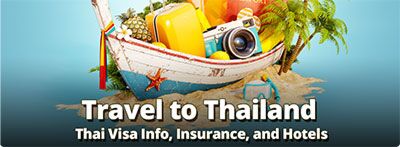
Required Documents for Travel to Thailand
Please have the following documents ready.
- Passport with at least six month validity
- Visa or visa exemption qualification
- Buy Thailand Travel Insurance
- Boarding pass to be presented at Passport Control
- Hotel booking confirmation if asked by Immigration Officer
- Note: Vaccination record no longer required
Incorrect documents will delay the entry screening by rules from the Thai immigration bureau and its Thai immigration officials.
Buy Your Insurance Now
Passport Validity / Visas
The first thing to check before planning to travel to Thailand is the validity of your passport. International travel requires that your passport is not expiring within six months of your travel date. If you have less than six months left on your passport, you cannot enter Thailand.
If you are planning to travel in the future, check your passport early so you know if you need to apply for a new one or not. It is best to check with your local embassy about how long it will take to receive your new passport. As people look to travel again, passport departments are swamped with new applications and this is causing a backlog in many countries.
There are several visas available to foreigners who are planning to visit Thailand. The visa you need will depend on where you are from, your purpose of travel, and how long you intend to stay.
Visa Exemption
A foreign visitor may enter Thailand under the Visa Exemption Program . Nationalities under the Visa Exemption Program may enter Thailand without a visa from a Thai Embassy or Consulate.
Upon arriving in Thailand, most nationalities who are part of the Visa Exemption Program may stay for up to 30 days. Certain nationalities can arrive as part of this program, but for a shorter time. It is best to check the country exemption list and confirm how long you can visit Thailand without needing to apply for a Visa.
Tourists arriving under visa exemption are eligible to extend their stay for up to a further 30 days by visiting a local Thai Immigration Office. The cost to extend is approximately 2000 baht.
There is often confusion about Visa Exemption and “Visa on Arrival”. Visa on Arrival is a 15-day visa for travelers from India, China, and 16 other countries. If you do not find your country on the Visa Exemption list, it is best to check the Visa on Arrival list.
There are some important things to note for Visa on Arrival:
- A passport must be valid for at least 30 days.
- The purpose of the visit is strictly tourist.
- A visitor must show an address in Thailand where they will be staying.
- A traveler must have a confirmed return flight.
- Must show proof of funds to the value of 10,000 baht per person or 20,000 baht for a family.
- A fee of 2000 baht is paid on arrival. The fee must be paid in cash and in Thai baht.
Tourist Visa and Special Tourist Visa (STV)
Foreigners may also apply for a Tourist Visa from a Thai embassy or consulate. There is the normal 60-day tourist visa that can be extended for additional 30 days, or the 90-day Special Tourist Visa (STV), which can be extended for 90 days twice at a local immigration office. There are certain requirements needed for the STV, but it allows a visitor to potentially stay in Thailand for 9 months. The Special Tourist Visa is currently scheduled to halt applications in September.
Contact your local Thai Embassy to verify what documents are needed to complete the process. When your visa is approved, the Embassy will place a sticker on your passport, so allow time for potential postage.
For those entering Thailand for a different purpose of stay, they need to obtain a Thai visa from their local Thai Embassy or Consulate prior to coming to Thailand.
Non-Immigrant Visa
Foreigners may apply for a wide range of long-term non-immigrant visas:
- Non-immigrant B Visa – for conducting business or employment
- Non-immigrant O visa – for visiting Thai spouse and family
- Non-immigrant ED visa – for students of recognized institutions in Thailand and their Parents or Legal guardian
- Non-immigrant O retirement visa – for those who wish to retire in Thailand
- Non-immigrant OA and OX visa – for those who wish to obtain a Thailand retirement visa for a long stay (it differs from type O visa)
The above visas can be organized at a local Thai Embassy or Consulate. The paperwork can be quite involved, but there are companies that can help.
Siam Legal International is a reputable company in Thailand that has offered visa assistance to foreign visitors for years. They are well versed in Thai immigration policies and processes. If you would like to streamline your long-term stay in Thailand, it is worth contacting them.
Thai Elite Visa
If you wish to make Thailand easily accessible for many years to come or are perhaps thinking of relocating permanently, it is worth having a look at the Thai Elite Visa.
The Thai Elite Visa allows foreign citizens to live in Thailand for 5, 10, or even 20 years. Thai Elite members do not need to worry about some of the eligibility criteria that are needed when applying for other long-term visas.
The Thai Elite visa is an exclusive visa that offers a host of benefits to holders. If you want to enjoy “Thai life” for the long term, you can read more about the Thai Elite Visa .

Proof of Vaccine or Testing
How a visitor enters Thailand will still depend on their vaccination status.
Vaccinated Travelers
Vaccinated travelers do not need to provide proof of vaccination to Thai authorities before arriving. A vaccinated traveler will need to have a copy of their vaccination certificate either printed or on a digital device and be able to present it if asked.
Thailand does not require visitors to have had a third booster shot. 2 shots (1 shot for Jansen) is considered fully vaccinated and accepted.
Unvaccinated Travelers
Unvaccinated travelers will need to complete an RT-PCR test or Professional Antigen Test (Pro-ATK) within 72 hours before boarding a flight in their departure country. They will need to have a copy of the test result and be able to present it if asked.
The RT-PCR and Pro-ATK test must be completed by a medical professional and a test report received. The home ATK (RAT) self-test is not acceptable for entering Thailand.
Vaccination and Testing for Children
The testing requirement for children under 18 depends on the vaccination status of their parents. Children traveling with vaccinated parents do not need to complete any RT-PCR or Pro-ATK test before entering Thailand. Children traveling with unvaccinated parents will need to complete the same test as their parents within 72 hours of departing their home country.
It is important to note that many airlines are still asking for proof of vaccination or a Covid test before boarding flights. If you cannot produce one of these documents, you might not board the flight.
Though foreigners no longer need to provide evidence of testing or vaccination prior to arriving in Thailand, they are still required. Thai authorities are conducting random checks of international passengers and if a vaccination certificate or test result cannot be shown, a visitor will not be allowed to enter Thailand.
Insurance has become a dirty word during Covid. Seasoned travelers have always understood the importance of having comprehensive Travel Insurance when traveling abroad. Travel insurance protected travelers from unexpected incidents like:
- Medical emergencies
- Personal injury & accidents
- Missed or delayed flights
- Damage to belongings
- Lost luggage
It was one of those things that people hoped they would never need but regretted not having when needed.
During the Pandemic, proof of insurance became mandatory when visiting countries like Thailand. Over time, people stopped referring to insurance as “Travel Insurance” and always referred to it as “Covid Insurance”. Because you had to have it, it was another hoop to jump through.
The good news is that you no longer need to provide proof of “Covid Insurance” to enter Thailand. But it is recommended because all the things listed above can still happen, and Covid has not disappeared completely.
Foreign visitors are not eligible for free medical care in Thailand if something should happen. Whether it be an accident or personal injury, if a visitor needs medical help, or has a canceled flight, they will need to cover any expenses themselves. Depending on the severity, this could be hundreds, if not thousands, of dollars.
Buying good Travel Insurance shouldn’t break the bank. Protecting yourself is cheaper than medical bills, new flights, and replacing lost luggage.
You can buy Travel Insurance from many companies. But if you are looking for coverage that is designed for Thailand, is trusted by Thai authorities and medical institutions, and offers a helpline with people who speak the local language and know the country’s procedures, it is worth checking out AXA Thailand .
Their policies are well priced, straightforward, offer many benefits to its customers, and can be approved in minutes.
Get your travel insurance here: https://u.axa.co.th/Sawasdee_Siamlegal

Hotel and Proof of Address Updates
Previously, a foreign visitor would complete an Arrival Card (TM6) before entering Thailand. This requirement has been temporarily removed as part of a new initiative by the Thai government.
A visitor no longer needs to provide proof of a hotel booking before departing their country, but will still need to provide an address when passing through Passport Control in Thailand. This address can be a hotel, home, or friend’s address.
This is especially true with people arriving on a pre-approved visa from a Thai Embassy or Consulate.
From July 1, travelers are no longer required to book a SHA+ hotel and undergo an RT-PCR test on arrival. Most hotels have removed their SHA+ quarantine packages, but you will still see the SHA+ badge displayed on hotels.
It is recommended to browse hotels in Thailand on Agoda.com before arriving as it is easier to organize transport to your first night’s rest if pre-booked.

Thailand Pass
From July 1st, 2022, foreign travelers no longer need to apply for a Thailand Pass before entering Thailand. The system is still in place but is now a platform where visitors can notify the Thai authorities and medical facilities if they are diagnosed positive for Covid during their stay.
If you need to access the Thailand Pass system while in Thailand, please visit https://tp.consular.go.th/ and register by filling in your personal details on the Thailand Pass registration page.
International Arrivals
Travelers do not need to provide any proof of flights before leaving their home country.
There is a lot of discussion about whether a return flight needs to be booked when entering Thailand. Technically, all visitors should have a return flight booked. However, you will not always be asked to present evidence of a return flight.
If a visitor is entering Thailand with a pre-approved visa, or Visa on Arrival, they will often be asked to present details of their exit flight. Sometimes a visitor did not have a return flight and had to book a flight on the spot before being processed through Passport Control. To avoid this, it is best to book an exit flight that can be changed. You can always change your plans once in Thailand.
Domestic flights
There are no longer any restrictions on domestic flights and travel. When entering Thailand at an international terminal, a traveler is free to transit to a domestic flight right away. “Sealed” flights have been removed.
Domestic airlines will not always ask for proof, but it is best to have your vaccination certificate or Covid test result on hand in case you are asked to show it.
Siam Legal has received reports from potential clients that some hospitals are creating difficulties for them until full payment is made for their medical expenses. Also, foreigners have allegedly been threatened with lawsuits for not settling their medical bills before being discharged. Using out-of-country policies can be problematic. We recommend using insurance providers headquartered inside Thailand with a proper cover to avoid any undesirable outcomes.
Siam Legal International, a premier law firm in Thailand, recommends purchasing the proper insurance and so endorses AXA Insurance for your travel to Thailand insurance needs.
HERE ARE SOME IMPORTANT POINTS YOU NEED TO KNOW BEFORE PURCHASING TRAVEL INSURANCE
- Please review the details of any insurance before purchasing to understand if the policy has adequate cover. Cheap policies with inadequate levels of cover can lead to significant personal liability, and scenarios where policy holders incur hundreds of thousands of baht in out-of-pocket medical expenses have been reported. There are significant financial risks to being underinsured during your stay in Thailand.
- These policies do not cover medical costs from accidents (like motorcycle accidents) or common unexpected illnesses (common fever or food poisoning). Best to pay a few baht more for the peace of mind that comes from having proper coverage.
- AXA covers medical expenses (outpatient and inpatient) for accidents and illnesses, including COVID-19. Other insurance coverage might not.
- AXA also covers telemedicine and teleconsultation, which may be required during the quarantine period of any traveler.
Thai hospital staff are familiar with AXA cover, which should prevent any inconvenience during hospital admission or medical treatment from your hotel room. AXA Thailand also offers 24/7 local support during your stay in Thailand.
You can buy your Thailand Travel insurance today at:
https://u.axa.co.th/Sawasdee_Siamlegal
List of approved covid-19 vaccines.
As of December 1, the MoPH has approved the following vaccines:
- Pfizer–BioNTech or Comirnaty
- Janssen or Janssen/Ad26.COV2.S
- AstraZeneca or Covishield
- Sinopharm or COVILO
- CoronaVac or SinoVac
- Sputnik Lite
How to Obtain Travel Insurance
Though COVID-19 insurance is no longer mandatory for entry to Thailand, it is recommended to have comprehensive Travel insurance for the duration of your stay. Good travel insurance covers not only medical expenses relating to Covid but also accident cover, personal damage, loss of possessions, and missed or delayed flights.
It is best to purchase insurance before you travel. The easiest way to buy your policy is online through a reputable insurance provider. The insurance company will provide you with the all-important certificate of cover that you can present to authorities or medical professionals if you need to make a claim.
You may also be asked to present this certificate to the airline before they will allow you to onboard. It’s quick and easy to do online. You can choose your length of policy from 7, 15, 30, 60 days, and 180 days. Just make sure that the policy covers your entire period of stay in Thailand as foreigners are not eligible for free medical care in Thailand and insurance companies will not cover claims for existing conditions.
You may purchase AXA COVID-19 travel insurance within a few minutes. Check them below.
You can buy budget insurance here: https://www.siam-legal.com/axa-insurance

How to Open a Bank Account in Thailand
Siam Legal offers and provides aid for a smooth and hassle-free way to open up a Thai bank account.
- You will receive help in opening a savings/current bank account
- You will receive a Bankbook and a debit/ATM card
- Online Banking (Thai mobile number is required)
Requirements
- Guarantee letter (to be provided by Siam Legal)
- The applicant may book our service online.
- Our staff will prepare the application and necessary documents for the bank and arrange an appointment with the applicant.
- The applicant will collect the application form and documents from the Siam Legal Bangkok office and proceed to the specific bank branch. Opening the account at the bank takes 1 to 2 hours.
Service Fee
Our service fee is 150 USD for opening a Thai savings account in Bangkok.
City Travel Guide
- How to Travel to Bangkok
- How to Travel to Phuket
- How to Travel to Pattaya
- How to Travel to Chiang Mai
- How to Travel to Samui
- How to Travel to Hua Hin
Useful Links
- Best COVID-19 Insurance for Foreigners
- Thailand Elite Visa – long term visa option for Thailand
- How to Travel to Thailand in 2022 – Your Ultimate Guide
Related Posts
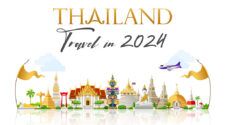
How to Travel to Thailand in 2024

Best Places to Retire in Thailand for Couples
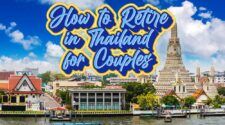
How to Retire in Thailand for Couples

Thailand Travel Restrictions 2023
Thailand Travel Restrictions
Traveler's COVID-19 vaccination status
Traveling from the United States to Thailand
Open for vaccinated visitors
COVID-19 testing
Not required
Not required for vaccinated visitors
Restaurants
Recommended in public spaces.
Thailand entry details and exceptions
Documents & additional resources, ready to travel, find flights to thailand, find stays in thailand, explore more countries on travel restrictions map, destinations you can travel to now, dominican republic, netherlands, philippines, puerto rico, switzerland, united arab emirates, united kingdom, know when to go.
Sign up for email alerts as countries begin to open - choose the destinations you're interested in so you're in the know.
Can I travel to Thailand from the United States?
Most visitors from the United States, regardless of vaccination status, can enter Thailand.
Can I travel to Thailand if I am vaccinated?
Fully vaccinated visitors from the United States can enter Thailand without restrictions.
Can I travel to Thailand without being vaccinated?
Unvaccinated visitors from the United States can enter Thailand without restrictions.
Do I need a COVID test to enter Thailand?
Visitors from the United States are not required to present a negative COVID-19 PCR test or antigen result upon entering Thailand.
Can I travel to Thailand without quarantine?
Travelers from the United States are not required to quarantine.
Do I need to wear a mask in Thailand?
Mask usage in Thailand is recommended in public spaces.
Are the restaurants and bars open in Thailand?
Restaurants in Thailand are open. Bars in Thailand are .
We’re sorry, this site is currently experiencing technical difficulties. Please try again in a few moments. Exception: request blocked

2022 THAILAND Travel Requirements + Easy THAILAND PASS with Agoda

Great news for those who miss Thailand! Starting May 1, it will be easier (or less difficult) to visit the Land of Smiles!
But of course, like many others, Thailand implements an additional layer of security for the protection of both its citizens and visitors — the Thailand Pass QR Code . This is required for travelers who will arrive by air and by land.
But did you know that you can expedite your application for the Thailand Pass QR Code when you book your accommodation with Agoda? Here’s how to get instant booking verification for Thailand QR Pass via Agoda booking.
- The Thailand Pass QR Code is required for those traveling by air and by land only. For those traveling by sea, contact the nearest Thai embassy/consulate from your place of origin for the Certificate of Entry and other requirements.
- Your travel requirements when traveling to Thailand will depend on your vaccination status and specific destination.
WHAT'S COVERED IN THIS GUIDE?
Thailand Entry Requirements
Depending on your vaccination status and destination, there are different entry options for international travelers who wish to visit Thailand. The parameters and requirements for each change frequently so it’s better to visit the official site for the latest updates and more details.
But to give you a brief overview, here are the requirements:
If traveling ON or AFTER May 1, 2022
For fully vaccinated travelers.
- Thailand Pass registration
- Valid passport
- Vaccination certificate
- Insurance with minimum of 10,000 USD coverage for medical treatments in Thailand (for non-Thai travelers only). Note that this has been reduced from the previous 20,000 USD required of those traveling before May 1.
COVID-19 test is NO longer required.
For Unvaccinated Travelers
OPTION A. Travelers with negative RT-PCR test result released within 72 hours prior to travel must present the following:
- negative RT-PCR test result released within 72 hours prior to travel
- Insurance with minimum of 10,000 USD coverage for medical treatments in Thailand (for non-Thai travelers only).
- NOTE: Additional COVID-19 test upon or after arrival in Thailand is NO longer implemented.
OPTION B. Travelers who CAN’T present an RT-PCR test result within 72 hours prior to the trip or those who prefer to be quarantined must submit the following:
- Confirmed Alternative Quarantine (AQ) hotel booking for 5 days (including 1 RT-PCR test)
- NOTE: RT-PCR test on Day 4 – 5 of mandatory quarantine is required.
If traveling BEFORE May 1, 2022
These are the three entry options for international travelers from any countries around the world who wish to visit Thailand.
TEST & GO Program
Fully vaccinated tourists traveling to Thailand by air are eligible for this program. Travelers who received a negative RT-PCR test result on their first COVID-19 test can travel anywhere in Thailand.
On the fifth day, travelers are required to take a self-test Antigen Testing Kit (ATK). The test result must be reported using the Mor Chana mobile app, so you need to download it.
Travelers under this program must secure the following:
- Paid 1-night SHA Extra Plus or AQ hotel booking confirmation
- Airport transportation to hotel
- One RT-PCR test that must be taken on Day 1
- One self-ATK test that must be taken on Day 5 (if staying more than five days in Thailand)
- Paid flight confirmation for departure (if staying less than five nights)
Blue Zone Sandbox Program
Blue Zones, also called Sandbox, are areas in Thailand where at least 70% of the population are fully vaccinated. Fully vaccinated tourists traveling to Thailand by air are eligible for this program. Travelers are required to stay within the Sanbox areas for five days, but they must first get a negative result from the first RT-PCR test before they can travel within the Blue Zone.
On the fifth day, travelers are required to take a self-test Antigen Testing Kit (ATK). After getting a negative result, travelers can now explore other Thailand destinations. The test result must be reported using the Mor Chana mobile app, so you need to download it.
- Paid 5-night SHA Extra Plus hotel booking confirmation within the Sandbox area
- One RT-PCR test to be taken on Day 1
- You will receive a self-ATK test to be taken on Day 5 (if staying more than five days in Thailand)
Some of the Sandbox destinations include Bangkok, Phuket, Krabi, Phang-Nga, and Surat Thani. You can check the full list of Blue Zone Sandbox destinations on the official website of the Thai Embassy.
Attention! As of writing, travelers to Ko Samui, Ko Pha-ngan, and Ko Tao need to take the first RT-PCR test upon arrival at Samui International Airport.
Alternative Quarantine Program
Also known as Happy Quarantine, Alternative Quarantine is a program or scheme for unvaccinated or partially vaccinated travelers as well as tourists who are entering Thailand BY LAND . Travelers are required to stay in a government-approved quarantine hotel for five (5) days.
Alternative Quarantine hotels usually cover the following:
- 5-night stay at a government-approved AQ hotel or similar government-authorized facility
- Airport transfers
- 24-hour medical/health supervision
- Full board meals (breakfast, lunch, dinner)
- COVID-19 tests
- Other services (depending on the hotel promo/offer)
How to Instantly Validate Agoda Hotel Booking on Thailand Pass
As you can see above, NOT ALL travelers need to present confirmed accommodation booking. But depending on your travel date and your vaccination status, you might need to submit proof that you have a confirmed reservation with a government-approved SHA (Safety and Health Administration) Extra Plus hotel or an AQ (Alternative Quarantine) hotel. This must be verified by the system in order to secure a Thailand Pass.
If you need a hotel, consider booking with Agoda. The booking website recently started a special collaboration with the Thai government, allowing Agoda customers to have their hotel bookings instantly validated by Thailand Pass. Here’s how to do it.
1. Book your hotel on Agoda.
You may check the list of qualified hotels here: THAILAND PASS HOTELS! ✅
Make sure you’re booking a property that is appropriate for your entry method to Thailand. SHA++ are marked on the label.
On the other hand, Quarantine hotels have something like this on the property page.
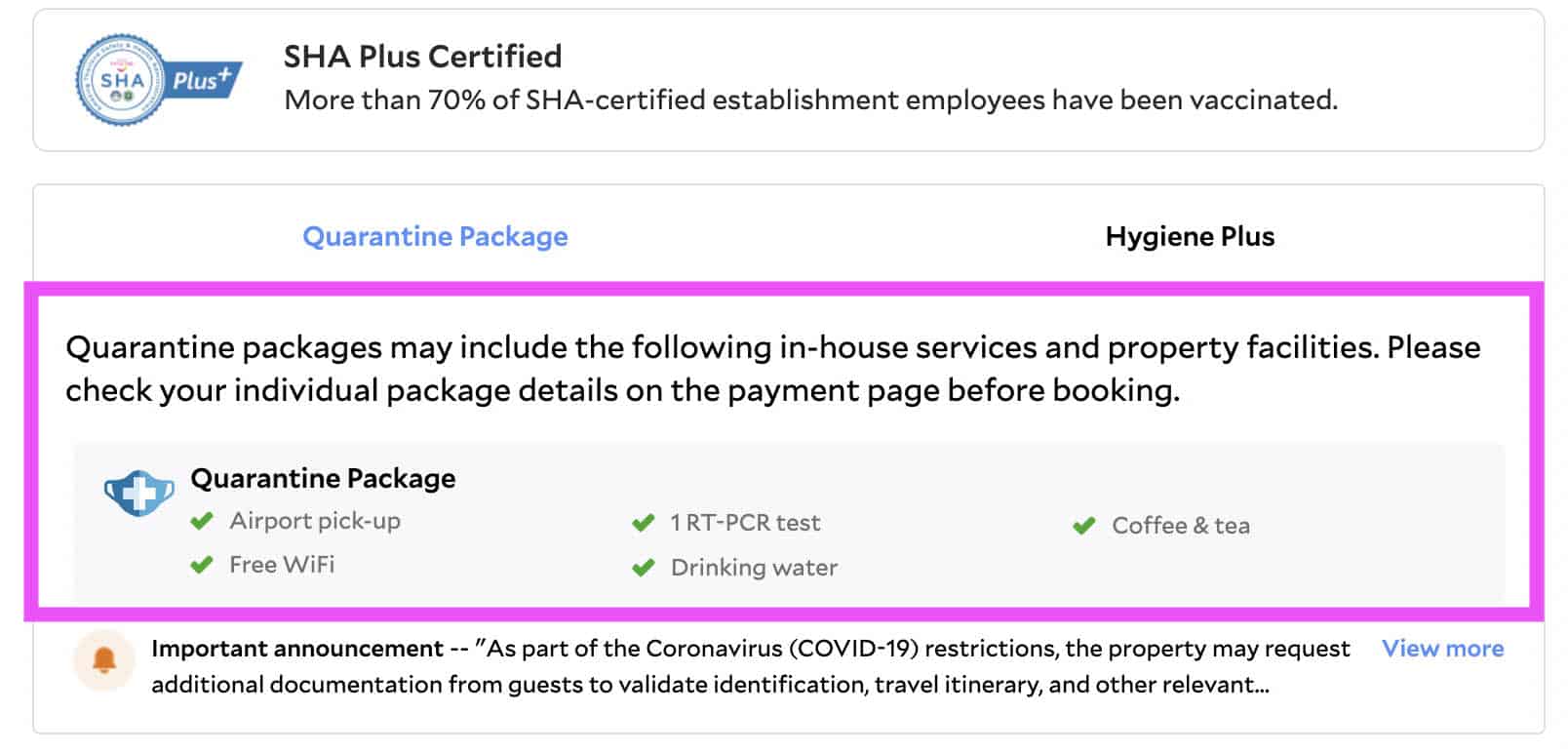
2. Register for Thailand Pass.
All travelers must apply for a Thailand Pass QR Code. Go to the Thailand Pass Registration website .
You need to register within seven (7) to 60 days prior to your departure.
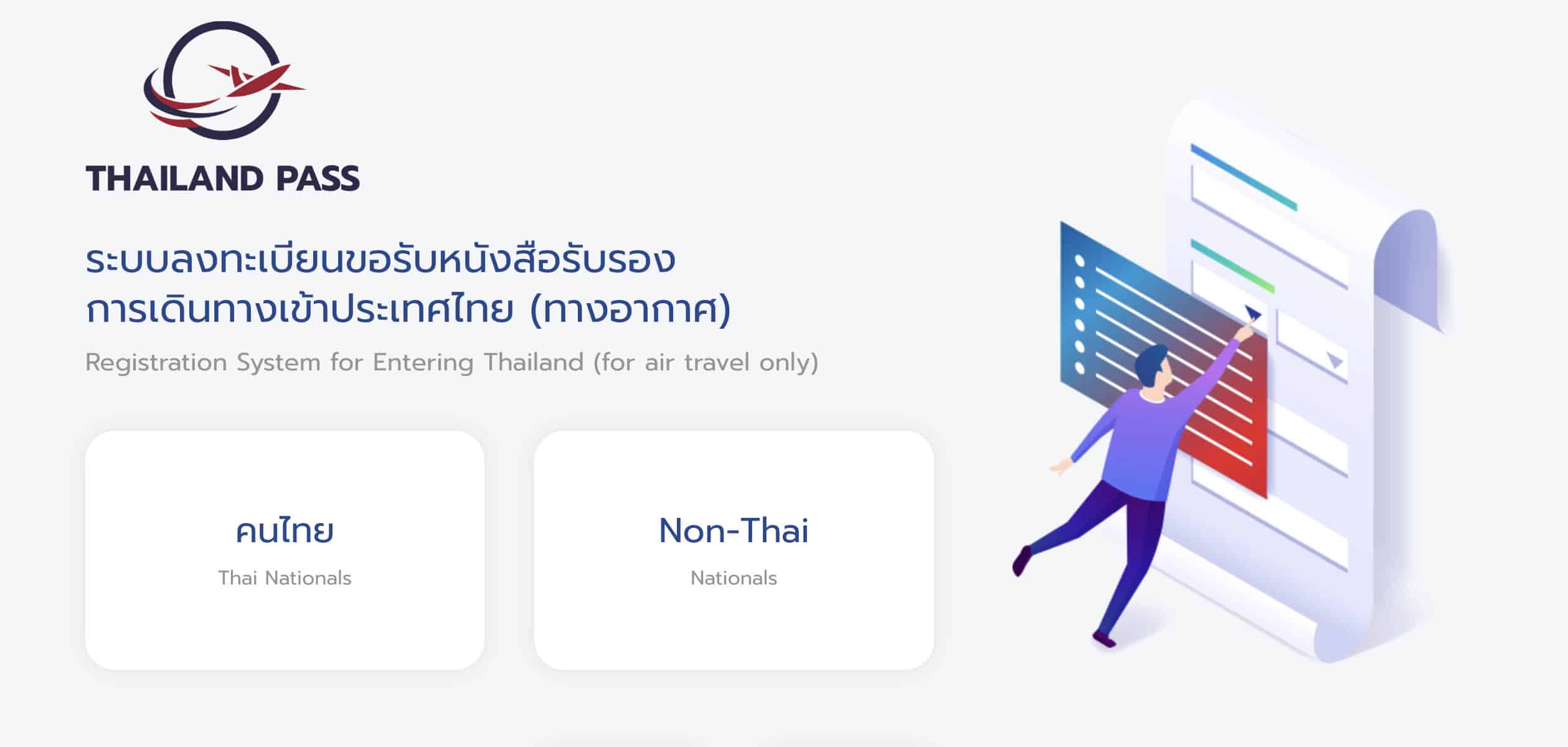
3. Enter your Agoda Booking ID.
- On the hotel booking information section, tick the “Booking with Agoda” box.
- Jump to the Booking ID section (third line) and provide your Booking ID.
- All other fields will be automatically filled out upon entering your Booking ID. Then, click the “Check my booking” button.
Voila! You will instantly get your booking validation.
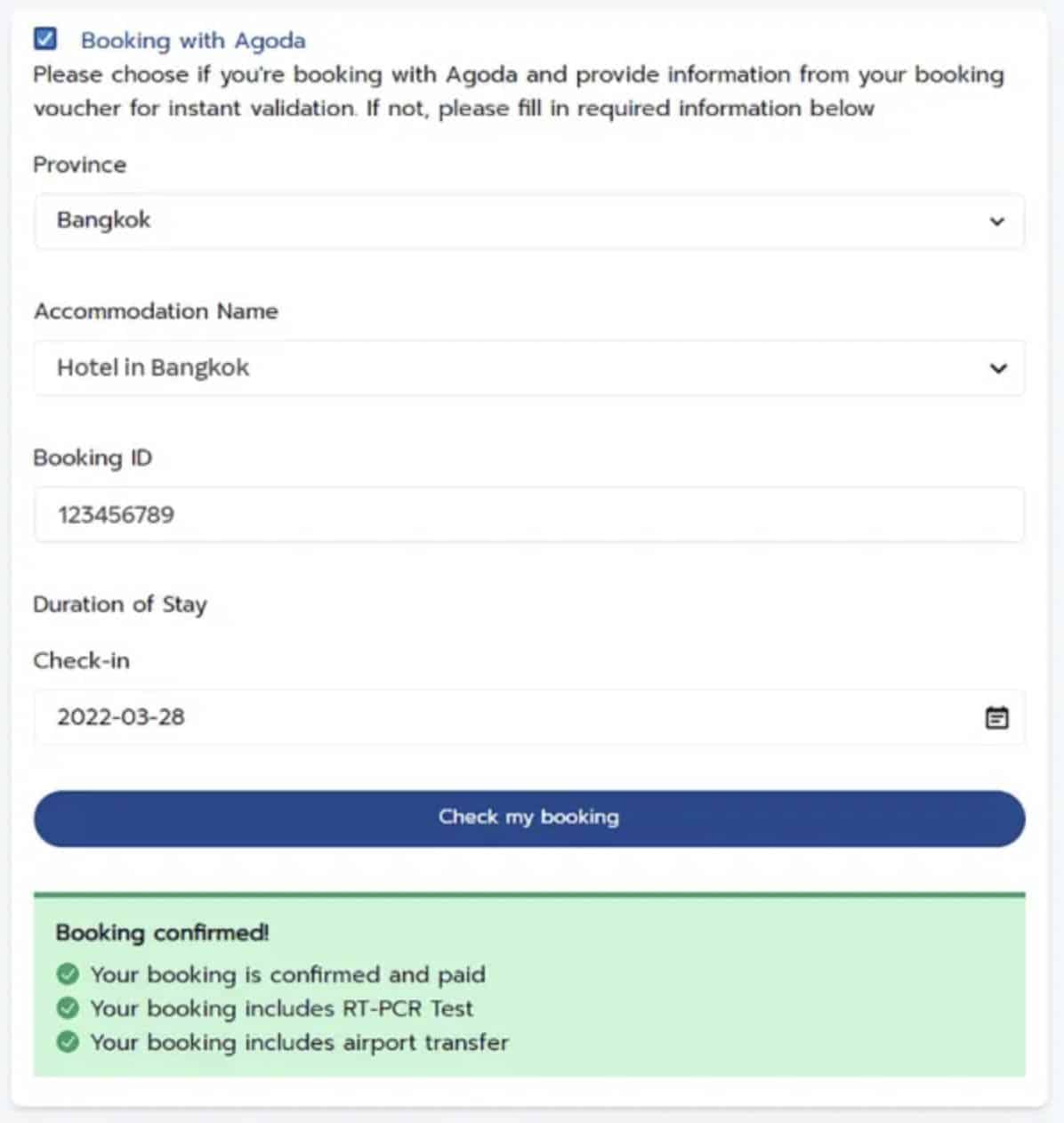
Note: If you lack a requirement or document (airport pick-up or COVID-19 test), you will get a notification. You must accomplish uploading the payment confirmation for the document that you lack. To avoid the hassle and additional steps, make sure that you book a room package that already includes airport pick-up and RT-PCR test.
The approval take up to seven (7) days. You can check your email for the approved application and your Thailand Pass QR Code.
Benefits of Booking via Agoda
- Complete hotel package options, including airport pick-up service and RT-PCR test (if applicable).
- Booking ID to easily fill out the hotel booking information section of your Thailand Pass registration.
- Instant booking validation for the Thailand Pass registration.
- Instant notification for missing documents during your application for Thailand Pass.
SHA Extra Plus (SHA++) Hotels vs AQ Hotels
Sha extra plus.
The SHA (Safety and Health Administration) Plus Certification is spearheaded by the Tourism Authority of Thailand to ensure maximum safety standards are followed to protect both the citizens and tourists while reviving the Thai tourism industry.
- SHA Extra Plus hotels or accommodations are those that meet the requirements, including at least 70% of staff fully vaccinated against COVID-19, set by Amazing Thailand SHA Plus.
- Properties with Extra Plus (SHA++) certifications are those with hospital partnerships that can administer an RT-PCR test.
- SHA Extra Plus hotels or accommodations can be booked by FULLY VACCINATED tourists traveling to Thailand.
- For those traveling before May 1, Test & Go package should be inclusive of RT-PCR test and an Antigen Test Kit (ATK), while Blue Zone Sandbox package must include RT-PCR test.
- Check with the hotel management for meals and other services inclusion.
Alternative Quarantine (AQ)
Alternative Quarantine is a quarantine process taken at government-certified quarantine hotels in Thailand.
- AQ hotels or accommodations are those approved by the government. They partner with select hospitals to administer the quarantine service inclusions. All expenses are shouldered by the travelers.
- AQ hotels or accommodations can be booked by UNVACCINATED tourists traveling to Thailand. The quarantine duration is five (5) nights, starting on the day of arrival.
- AQ 5-day quarantine package must include the following: full board meals (three meals per day), airport transfer to hotel, on-site nurse, free Wi-Fi, and COVID-19 tests.
- Check with the hotel for other services including snacks, consultation with a doctor, etc.
Top Bangkok Hotels
Here are some of the top Bangkok hotels on Agoda:
- Grande Centre Point Hotel Ratchadamri (SHA Extra Plus) offers quarantine package Check Rates & Availability! ✅
- Carlton Hotel Bangkok Sukhumvit (SHA Extra Plus) offers quarantine package Check Rates & Availability! ✅
- Grande Centre Point Hotel Ploenchit (SHA Extra plus) Check Rates & Availability! ✅
- Millennium Hilton Bangkok (SHA Extra Plus) Check Rates & Availability! ✅
- Novotel Bangkok Sukhumvit 20 (SHA Extra plus) Check Rates & Availability! ✅
- W 21 HOTEL Bangkok (SHA Extra plus) Check Rates & Availability! ✅
- Siam Mandarina Hotel (SHA Extra Plus) offers quarantine package Check Rates & Availability! ✅
- Aspira One Sutthisan (SHA Extra Plus) offers quarantine package Check Rates & Availability! ✅
Search for more Thailand Hotels!
More tips on youtube ⬇️⬇️⬇️.
Is this post helpful to you?

Related Posts:
- Wat Pho: The Temple of the Reclining Buddha in Bangkok, Thailand
- In Photos: Thailand Tourism Festival 2016
- BANGKOK TRAVEL GUIDE with Budget Itinerary
- BANGKOK TO CHIANG RAI: By Train, Bus or Plane
- NEW BORACAY & KALIBO TRAVEL REQUIREMENTS & New Normal Guidelines 2022
- JAC LINER BUS: Open Terminals, Schedule, Routes, Stops & Fare (New Normal)
- PHILIPPINE ENTRY & QUARANTINE REQUIREMENTS (Filipinos & Foreigners, Vaccinated & Unvaccinated)
- STAYSAFE APP: Where to Download, How to Register & Use
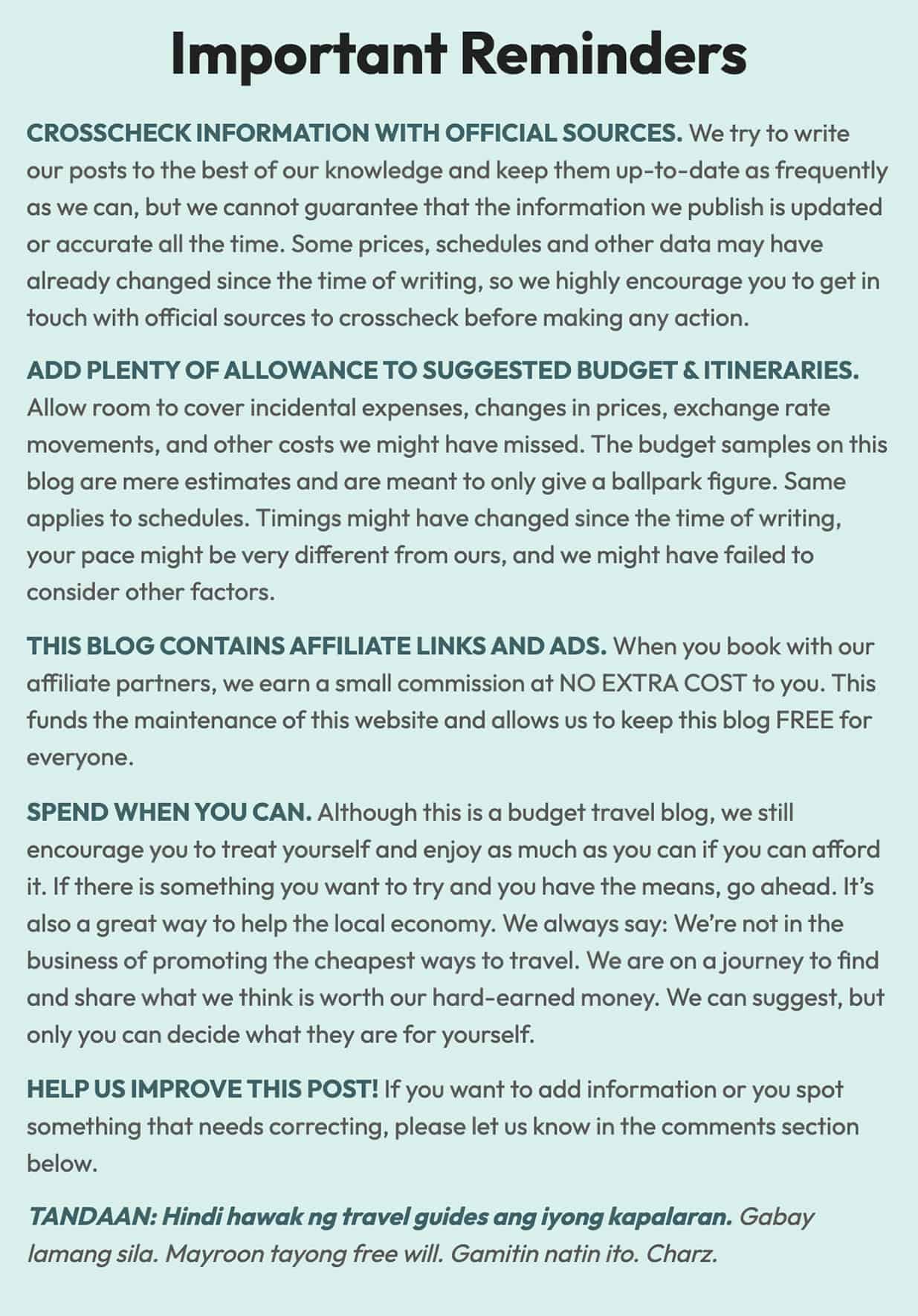
- Recent Posts
- 2024 STILTS CALATAGAN Beach Resort Travel Guide with Itinerary & Budget - 7 April 2024
- TOKYO SKYTREE TRAVEL GUIDE: Know Before You Visit! - 30 March 2024
- 37 BORACAY TOURIST SPOTS & Things to Do (with Prices!) - 6 November 2023
It took almost an hour to get this travel post article and it will really help me to explore Thailand after returning from my trip to turkey as we have already made a plan to visit Thailand on my next vacation. Nice informative article as far as tour guidelines.
Featured On

We heard you!
Your comment is now queued for moderation! We’ll try to get back to you soonest. While waiting, follow us on these channels.
Subscribe on Youtube! Follow us on Instagram!
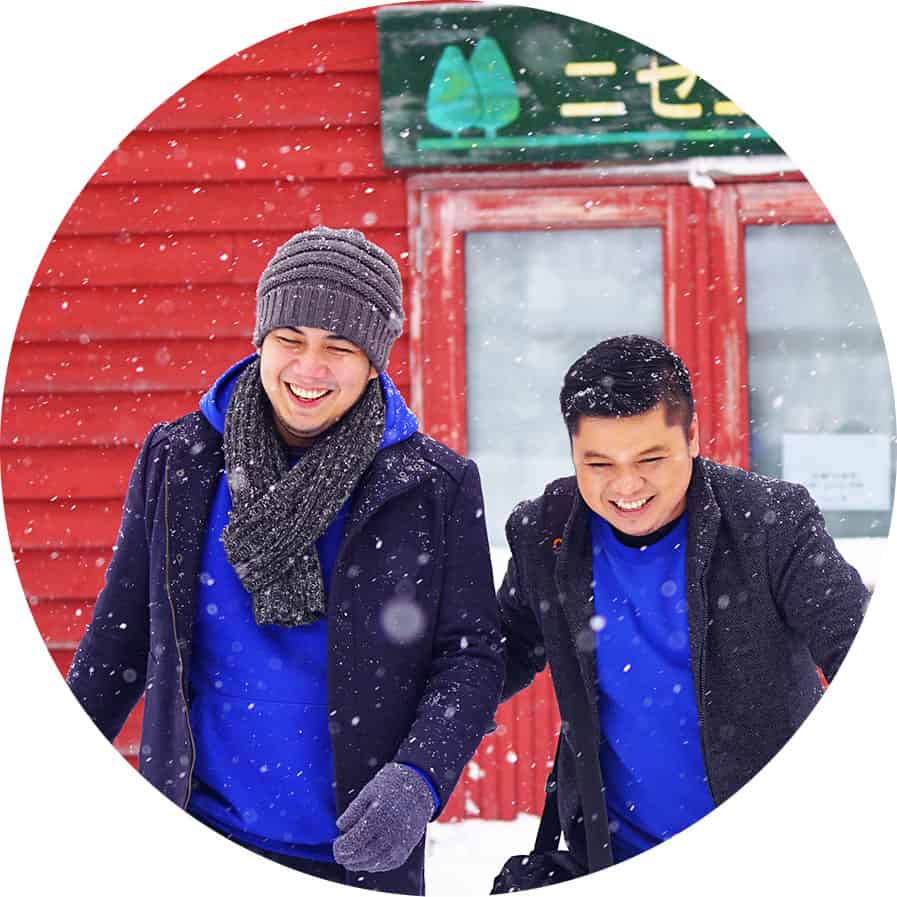
Thailand’s entry requirements from 1 July 2022: Thailand Pass removed
Also lifting an us$10,000 health insurance requirement, thus welcoming all travellers with proof of either a certificate of vaccination or a pre-arrival negative rt-pcr or professional atk test result..
This information has been updated on 24 June, 2022.

The following rules will be in effect from 1 July, 2022, with specific requirements for vaccinated and unvaccinated/not fully vaccinated travellers from all countries/territories with scheduled arrivals from this date.
Pre-arrival requirements.
Vaccinated travellers must have the following documents for entering Thailand:
- A valid passport, or a border pass for arrivals via border checkpoints.
- Everyone 18 years of age and older must be fully vaccinated for COVID-19 with an approved vaccine at least 14 days before travelling to Thailand.
- Travellers 5-17 years of age travelling to Thailand unaccompanied must get vaccinated with at least 1 dose of an approved vaccine at least 14 days before travelling to Thailand. Those travelling with parents are exempt from this requirement.
Unvaccinated/not fully vaccinated travellers must have the following documents for entering Thailand:
- A proof of a negative result from an RT-PCR test or professional ATK within 72 hours before travel.
On Arrival Requirements
Upon arriving in Thailand, all travellers must undergo entry screening including body temperature check, and present the required documents to the Immigration/Health Control officer to carry out the checks.
The vaccinated travellers will then be allowed entry and are free to go anywhere in the kingdom. *For arrivals by land using a border pass, they will be allowed a stay of no longer than 3 days within the specified areas only.
Likewise, unvaccinated/not fully vaccinated travellers who have proof of a negative result from an RT-PCR test or professional ATK within 72 hours of travel will be allowed entry and are free to go anywhere in the kingdom.
The unvaccinated/not fully vaccinated travellers without a negative test result within 72 hours of travel are required to follow the public health instructions and guidelines as deemed appropriate by the Health Control officer at the point of arrival. All expenses incurred will be the responsibility of the travellers.
During the Stay
- While in Thailand, both vaccinated and unvaccinated/not fully vaccinated travellers are advised to strictly follow the health and safety standards. Travellers who are experiencing COVID-like symptoms should get tested. If testing positive, they must get the appropriate medical treatment.
We wish all visitors an enjoyable, safe, and rewarding holiday in Thailand during this exciting time in which we are able again to welcome travellers from around the world.
TAT Newsroom
Tat stages successful amazing thailand roadshow to south korea, thailand lifts nationwide covid-19 restrictions with immediate effect, related articles.

Thailand Suspends Filing of TM6 Immigration Form for Land and Sea Arrivals

Thailand expands visa-free access for tourists from China and Kazakhstan

Update April 12, 2024
Information for u.s. citizens in the middle east.
- Travel Advisories |
- Contact Us |
- MyTravelGov |
Find U.S. Embassies & Consulates
Travel.state.gov, congressional liaison, special issuance agency, u.s. passports, international travel, intercountry adoption, international parental child abduction, records and authentications, popular links, travel advisories, mytravelgov, stay connected, legal resources, legal information, info for u.s. law enforcement, replace or certify documents.
Before You Go
Learn About Your Destination
While Abroad
Emergencies
Share this page:
Travel Advisory July 24, 2023
Thailand - level 1: exercise normal precautions.
Reissued with obsolete COVID-19 page links removed.
Exercise normal precautions in Thailand. Some areas have increased risk. Read the entire Travel Advisory.
Reconsider travel to:
- Yala, Pattani, Narathiwat, and Songkhla provinces due to civil unrest associated with ongoing insurgent activities.
Read the country information page for additional information on travel to Thailand.
If you decide to travel to Thailand:
- Enroll in the Smart Traveler Enrollment Program (STEP) to receive Alerts and make it easier to locate you in an emergency.
- Follow the Department of State on Facebook and Twitter .
- Review the Country Security Report for Thailand.
- Have evacuation plans that do not rely on U.S. government assistance.
- Visit the CDC page for the latest Travel Health Information related to your travel.
- Prepare a contingency plan for emergency situations. Review the Traveler’s Checklist .
Yala, Pattani, Narathiwat, and Songkhla Provinces – Level 3: Reconsider Travel
Periodic violence directed mostly at Thai government interests by a domestic insurgency continues to affect security in the southernmost provinces of Yala, Pattani, Narathiwat, and Songkhla. In Songkhla, the insurgency is most active in the districts of Chana, Thepha, Nathawat, and Saba Yoi. U.S. citizens are at risk of death or injury due to the possibility of indiscriminate attacks in public places.
The U.S. government has limited ability to provide emergency services to U.S. citizens in these provinces as U.S government employees must obtain special authorization to travel to these provinces.
Visit our website for Travel to High-Risk Areas .
Embassy Messages
View Alerts and Messages Archive
Quick Facts
6 months from date of entry required
One page is required per entry stamp; please note endorsement pages are not considered blank passport page
No, if your stay is less than 30 days
Yellow fever may be required if arriving from certain countries with yellow fever
Embassies and Consulates
U.S. Embassy Bangkok 95 Wireless Road Bangkok 10330 Thailand Telephone: + (66) (2) 205-4049, 02-205-4049 (within Thailand) Emergency After-Hours Telephone: +(66) (2) 205-4000, 02-205-4000 (within Thailand) Fax: +(66) (2) 205-4103, 02-205-4103 (within Thailand) Email: [email protected]
CONSULATE
U.S. Consulate General Chiang Mai 387 Witchayanond Road Chiang Mai 50300 Thailand Telephone: +(66) (53) 107-777, 053-107-777 (within Thailand) Emergency After-Hours Telephone: +(66) 81-881-1878, 081-881-1878 (within Thailand) Fax: +(66) (53) 252-633, 053-252-633 (within Thailand) Email: [email protected]
Destination Description
Learn about the U.S. relationship to countries around the world.
Entry, Exit and Visa Requirements
Visit the Royal Thai Embassy website for the most current visa information.
- U.S. citizen tourists entering Thailand for fewer than 30 days do not require a visa.
- We strongly recommend that your passport be valid for at least six months beyond the date of your arrival in Thailand to avoid possible denied entry.
- Thai immigration officials or airline staff may ask for your onward/return ticket.
- Business travelers, U.S. government employees travelling on official business, teachers, retirees, and those planning to stay longer than 30 days should check with the Royal Thai Embassy about visa requirements .
- If you overstay your visa, you will be fined. Depending on the length of overstay, you may also be arrested, detained, deported at your own expense, and banned from re-entering Thailand.
We strongly recommend you carry a copy of your U.S. passport identification page and current Thai visa to help avoid detention by the Thai immigration police.
Thailand’s entry/exit information is subject to change without notice. For the most current information, please see The Royal Thai Police Immigration Bureau .
You can find detailed information on vaccinations and other health precautions on the CDC website .
HIV/AIDS Restrictions: Some HIV/AIDS entry restrictions exist for visitors to and foreign residents of Thailand. However, these restrictions are generally not enforced. Please verify this information with the Royal Thai Embassy before you travel.
Find information on dual nationality , prevention of international child abduction and customs regulations on our websites.
COVID-19 Requirements: There are no COVID-related entry requirements for U.S. citizens.
Safety and Security
Terrorism: Terrorist groups and those inspired by such organizations are intent on attacking U.S. citizens abroad. Terrorists are increasingly using less sophisticated methods of attack – including knives, firearms, and vehicles – to more effectively target crowds. Frequently, their aim is unprotected or vulnerable targets, such as:
- High-profile public events (sporting contests, political rallies, demonstrations, holiday events, celebratory gatherings, etc.)
- Hotels, clubs, and restaurants frequented by tourists
- Places of worship
- Shopping malls and markets
- Public transportation systems (including subways, buses, trains, and scheduled commercial flights)
For more information, see our Terrorism page.
Periodic acts of violence in Thailand remain a concern. In August 2019, several small explosions and related arson events occurred in various locations throughout Bangkok resulting in no deaths but some injuries and minor property damage. Several small-scale bombings occurred near some tourist locations in the far Southern provinces in August 2016 and December 2018. In August 2015, an explosion near the Erawan Shrine in downtown Bangkok killed at least 20 people and injured more than 100. The U.S. Department of State assesses there is a continued risk of terrorism in Southeast Asia, including in Thailand.
If a protest or demonstration is expected to pass near the U.S. Embassy or Consulate facilities, Embassy and Consulate entrances and functions may be restricted. The U.S. Embassy in Bangkok’s website , Facebook, and Twitter sites and the U.S. Consulate General in Chiang Mai’s website , Facebook , and Twitter sites post information about local events that may affect Embassy functions. Enroll in the Smart Traveler Enrollment Program ( STEP ) to receive security and safety messages.
Far Southern Thailand: Periodic violence directed mostly at Thai government interests by a domestic insurgency continues to affect security in the southernmost provinces of Yala, Pattani, Narathiwat, and Songkhla. U.S. citizens are at risk of death or injury due to the possibility of indiscriminate attacks in public places. Martial law is in force in this region.
The U.S. government has limited ability to provide emergency services to U.S. citizens in these provinces. Travel to this region by U.S government employees must be reviewed and approved in advance. For more information on terrorist threats against U.S. citizens worldwide and steps to take as a result of these threats, please see the Worldwide Caution .
- Crimes of opportunity, such as pick-pocketing, bag-snatching, and burglary, occur in Thailand.
- Violent crimes against foreigners are relatively rare. However, murders, rapes, and assaults against foreigners do occur.
- Sexually motivated violence, committed by either Thai citizens or foreigners, is most likely to occur after time spent at bars, clubs, and parties, on beaches, or in remote/isolated areas. The Thai police response will differ from an investigation in the United States; investigating officials have publicly discredited people who have reported being the victim of crimes . In addition to making a report at the police jurisdiction in which the crime occurred, we advise contacting the Embassy and engaging a local attorney if you are a victim of an assault.
- When traveling alone, exercise caution, stay near other travelers, and ensure friends or family know how to contact you.
- Taxi and “tuk-tuk” drivers may attempt to charge excessive fares or refuse passengers. You should either request the driver use the meter or agree on the fare beforehand.
- At the airport use only public transportation from the airport’s official pick-up area, cars from the limousine counters, or a car from your hotel.
- Rental scams do occur in Thailand. Many rental motorbike, jet ski, and car companies will hold your passport until you pay for real or fictitious damages. We advise against using your passport as collateral.
- Exorbitant bar tab scams occur in Thailand. Some bars and entertainment venues will charge exorbitant prices for drinks or unadvertised cover charges and threaten violence if you don’t pay.
- Other scams involving gems, city tours, entertainment venues, and credit cards are common, especially in tourist areas.
International Financial Scams: See the Department of State and the FBI pages for information.
Internet romance and financial scams are prevalent in Thailand. Scams are often initiated through Internet postings/profiles or by unsolicited emails and letters. Scammers almost always pose as U.S. citizens who have no one else to turn to for help. Common scams include:
- Romance/Online dating
- Money transfers
- Grandparent/Relative targeting
- Free Trip/Luggage
- Work permits/job offers
Victims of Crime: U.S. citizen victims of crime are encouraged to contact the U.S. Embassy or Consulate for assistance. Report crimes to the local police by calling 191 or the Tourist Police at 1155 and contact the U.S. Embassy at +66 (0) 2-205-4049 or Consulate at +(66) (53) 107-777. Remember that only local officials have the authority to investigate and to prosecute a crime.
Domestic Violence: U.S. citizen victims of domestic violence are encouraged to contact the U.S. Embassy or Consulate for assistance. Report crimes to the local police by calling 191 or the Tourist Police at 1155 and contact the U.S. Embassy at +66 (0) 2-205-4049 or Consulate at +(66) (53) 107-777. Remember that only local officials have the authority to investigate and to prosecute a crime.
See our webpage on help for U.S. victims of crime overseas .
- Help you find appropriate medical care
- Assist you in reporting a crime to the police
- Contact relatives or friends with your written consent
- Explain the local criminal justice process in general terms
- Provide a list of local attorneys
- Provide our information on victim’s compensation programs in the U.S.
- Provide an emergency loan for repatriation to the United States and/or limited medical support in cases of destitution
- Help you find accommodation and arrange flights home
- Replace a stolen or lost passport
Tourism: The tourism industry is unevenly regulated, and safety inspections for equipment and facilities do not commonly occur. Hazardous areas/activities are not always identified with appropriate signage, and staff may not be trained or certified either by the host government or by recognized authorities in the field. In the event of an injury, appropriate medical treatment is typically available only in/near major cities. First responders are generally unable to access areas outside of major cities and to provide urgent medical treatment. U.S. citizens are encouraged to purchase medical evacuation insurance. See our webpage for more information on insurance providers for overseas coverage .
Local Laws & Special Circumstances
Criminal Penalties: You are subject to local laws. If you violate local laws, even unknowingly, you may be expelled, arrested, or imprisoned. Individuals establishing a business or practicing a profession that requires additional permits or licensing should seek information from the competent local authorities, prior to practicing or operating a business.
Furthermore, some laws are also prosecutable in the United States, regardless of local law. For examples, see our website on crimes against minors abroad and the Department of Justice website.
Arrest Notification: If you are arrested or detained, ask police or prison officials to notify the U.S. Embassy immediately. See our webpage for further information.
Conditions at the Bangkok Immigration Detention Center (IDC): Conditions in immigration detention centers (IDCs) where authorities detain foreign nationals who violate immigration laws remain poor and most are overcrowded. IDCs, administered by the Immigration Police Bureau, which reports to the Royal Thai Police (RTP), are not subject to many of the regulations that govern the regular prison system. U.S. citizen detainees often complain of stark, austere living conditions, overcrowding, and unhealthy conditions. Personal security is poor. In addition, the main IDC in Bangkok does not dependably provide adequate medical or mental health care. In 2019, two U.S. citizens died while in custody at the Bangkok IDC. Deportations are self-funded and it may take up to two weeks for Thai authorities to process a case before deportation. Detainees must have funds to purchase a phone card and do not have access to the internet. Prior approval and a security escort are required to visit a Western Union or an ATM machine.
- Please see the Immigration Act B.E. 1979 for more information about Thai Immigration violations.
- Please see the Department of State’s Report on Human Rights Practices for Thailand for further information.
Lèse majesté (Royal Insult): Thais hold the monarchy in the highest regard. Making a critical or defamatory comment about the royal family is punishable by a prison sentence of up to 15 years per offense. As an example, purposely tearing Thai bank notes, which carry an image of the King, may be considered a lèse majesté offense.
- Prostitution is illegal in Thailand. Serious consequences include criminal conviction and imprisonment, particularly in the case of child prostitution.
- Commercial surrogacy is banned.
- Personal use of even non-lethal military equipment, such as protective vests and night vision scopes, is prohibited.
- Illegal drugs carry severe penalties. Expect long jail sentences under harsh conditions, heavy fines, or even execution for possessing, using, or trafficking in illegal drugs.
- Shoplifting can result in large fines and lengthy detention followed by deportation.
- Domestic Issues: Local police are reluctant to become involved in domestic issues. You may call the Family Services Emergency hotline by dialing 1300 from any Thai phone.
- Possessing counterfeit or pirated goods is a crime in Thailand. For more information see the intellectual property section of the U.S. Department of Justice website .
Customs may enforce strict regulations on Buddha images, firearms, bullets and/or bullet casings, bullet-proof vests, night vision devices and other para-military type equipment, explosives, drugs, radios, books, and recordings, which might be cultural property and/or considered harmful to the public interest.
Faith-Based Travelers: See the following webpages for details:
- Faith-Based Travel Information
- International Religious Freedom Report – see country reports
- Human Rights Report – see country reports
- Hajj Fact Sheet for Travelers
- Best Practices for Volunteering Abroad
LGBTI Travelers: There are no known legal restrictions on same-sex sexual relations or the organization of LGBTI events in Thailand. However, LGBTI groups report that in the case of sexual crimes, police tend to downplay sexual abuse claims from LGBTI victims.
See our LGBTI Travel Information page and section 6 of our Human Rights report for further details.
Travelers Who Require Accessibility Assistance. Sidewalks and street crossings are not suitable for travelers with mobility issues. Newly constructed buildings, facilities, and transportation equipment should be accessible by law for persons with mobility issues. However, enforcement of these provisions is not uniform.
Students: See our Students Abroad page and FBI travel tips .
Women Travelers: Some victims of sexual assault or domestic violence find that Thai authorities do not handle such cases with as much sensitivity or consideration for privacy as they would expect in the United States. See our travel tips for Women Travelers .
Ambulance services are:
- not present throughout the country or are unreliable in most areas except for Bangkok and other major cities.
- Injured or seriously ill travelers may prefer to take a taxi or private vehicle to the nearest major hospital rather than wait for an ambulance.
Medical treatment is generally adequate in Thailand’s urban areas. In Bangkok, Chiang Mai, Phuket, and Pattaya, good facilities exist for routine, long-term, and emergency health care. Basic medical care is available in rural areas, but English-speaking providers are rare.
Medical tourism is an established and rapidly growing industry. You should consult with your local physician before traveling and also refer to information on medical tourism from CDC.
We do not pay medical bills. Be aware that U.S. Medicare/Medicaid does not apply overseas. Most hospitals and doctors overseas do not accept U.S. health insurance.
Medical Insurance: Make sure your health insurance plan provides coverage overseas. Most care providers overseas only accept cash payments. See our webpage for more information on insurance providers for overseas coverage. Visit the U.S. Centers for Disease Control and Prevention for more information on type of insurance you should consider before you travel overseas.
We strongly recommend supplemental insurance to cover medical evacuation.
Medicine for personal use is allowed as long as the amount does not exceed a 30-day supply and you bring the medicine with you. Do not mail medicine to Thailand without first confirming it will be allowed into the country.
If traveling with prescription medication, check with Thailand Customs and the Thailand Food and Drug Administration to ensure the medication is legal in Thailand. Always, carry your prescription medication in original packaging with your doctor’s prescription.
The following diseases are present:
- Chikungunya
- Japanese encephalitis
- Tuberculosis:
- Hepatitis A and B
- Melioidosis
Vaccinations: Be up-to-date on all vaccinations recommended by the U.S. Centers for Disease Control and Prevention.
Further health information:
- World Health Organization
- U.S. Centers for Disease Control and Prevention (CDC)
Air Quality: The air quality in Thailand varies considerably and fluctuates with the seasons, but seasonal smog is a problem. In recent years the air quality in Bangkok, Chiang Mai, Khon Kaen, Lampang, Nan, and Samut Sakhon have exceeded Thai and U.S. government daily standards for fine particulate matter (PM 2.5) for a portion of the year. In Chiang Mai and other northern provinces, annual agricultural burning, approximately February through late April, and forest fires cause days with unhealthy to hazardous air quality based on the U.S. index. In Bangkok environs, airborne dust and auto pollutants are prevalent in the cooler, dry period (December-February). Anyone who travels where pollution levels are high is at risk. People at the greatest risk from air pollution exposure include:
- Infants, children, and teens
- People over 65 years of age
- People with lung disease such as asthma and chronic obstructive pulmonary disease (COPD), which includes chronic bronchitis and emphysema;
- People with heart disease
- People who work or are active outdoors
For Bangkok and Chiang Mai, U.S. Mission Thailand is reporting the U.S. EPA’s Air Quality Index (AQI) calculated from PM2.5 data captured by monitors owned and maintained by the Royal Thai Government. The information and advice on health protection measures to take is available
Visit AirNow Department of State for information on air quality at U.S. Embassies and Consulates.
The U.S. Embassy maintains a list of doctors and hospitals . We do not endorse or recommend any specific medical provider or clinic.
Health facilities in general:
- Adequate health facilities are available in Bangkok and other major cities but health care in rural areas may be below U.S. standards.
- Hospitals and doctors require payment “up front” prior to service or admission. Credit card payment is not always available.
- Medical staff at public hospitals may speak little or no English.
- Patients bear all costs for transfer to or between hospitals.
- Psychological and psychiatric services are limited, even in the larger cities, with hospital-based care only available through government institutions.
Medical Tourism and Elective Surgery:
- Medical tourism is a rapidly growing industry. People seeking health care overseas should understand that medical systems operate differently from those in the United States and are not subject to the same rules and regulations. Anyone interested in traveling for medical purposes should consult with their local physician before traveling and visit the U.S. Centers for Disease Control and Prevention website for more information on Medical Tourism.
- We strongly recommend supplemental insurance to cover medical evacuation in the event of unforeseen medical complications.
- Your legal options in case of malpractice are very limited in Thailand.
- Although Thailand has many elective/cosmetic surgery facilities that are on par with those found in the United States, the quality of care varies widely. If you plan to undergo surgery in Thailand, make sure that emergency medical facilities are available and professionals are accredited and qualified.
Pharmaceuticals:
- Exercise caution when purchasing medication overseas. Pharmaceuticals, both over the counter and requiring prescription in the United States, are often readily available for purchase with little controls. Counterfeit medication is common and may prove to be ineffective, the wrong strength, or contain dangerous ingredients. Medication should be purchased in consultation with a medical professional and from reputable establishments.
- U.S. Customs and Border Protection and the Food and Drug Administration are responsible for rules governing the transport of medication back to the United States. Medication purchased abroad must meet their requirements to be legally brought back into the United States. Medication should be for personal use and must be approved for usage in the United States. Please visit the U.S. Customs and Border Protection and the Food and Drug Administration websites for more information.
Assisted Reproductive Technology and Surrogacy:
- If you are considering traveling to Thailand to have a child through use of assisted reproductive technology (ART) or surrogacy, please see our ART and Surrogacy Abroad page .
- Surrogacy is illegal for foreigners in Thailand, subject to complex local regulation. For additional information, visit the Government of Thailand’s website for information on foreigner surrogacy.
- If you decide to pursue parenthood in Thailand via assisted reproductive technology (ART) with a gestational mother, be prepared for long and unexpected delays in documenting your child’s citizenship. Be aware that individuals who attempt to circumvent local law risk criminal prosecution.
Water Quality:
- In many areas, tap water is not potable. Bottled water and beverages are generally safe, although you should be aware that many restaurants and hotels serve tap water unless bottled water is specifically requested. Be aware that ice for drinks may be made using tap water.
Adventure Travel:
- Visit the U.S. Centers for Disease Control and Prevention website for more information about Adventure Travel .
COVID-19 Testing: For the most current list of COVID-19 testing locations in Thailand approved by the Ministry of Public Health, please visit: http://service.dmsc.moph.go.th/labscovid19 . Testing is paid for by U.S. citizens.
The Ministry of Public Health provides a list of 44 laboratories approved to conduct COVID-19 testing found here .
Please Note : Same-day Covid-19 testing is available at most private hospitals throughout Thailand. Please reference this list of testing locations and contact the provider directly to inquire about COVID-19 testing options, scheduling, cost, and other information.
COVID-19 Vaccines: The COVID-19 vaccine is available for U.S. citizens to receive in Thailand. According to Thai authorities, both private and public hospitals are providing COVID-19 vaccines. More information on a list of hospitals in Thailand is available here .
The Bang Rak Vaccination and Health Center, the Institute of Dermatology, and the Bamrasnaradura Infectious Diseases Institute are currently providing free bivalent vaccines to non-Thai citizens on a walk-in basis.
Visit the FDA's website to learn more about FDA-approved vaccines in the United States.
Travel and Transportation
Road Conditions and Safety:
- Traffic accidents are common in Thailand. According to the World Health Organization , in 2018, Thailand had one of the world’s highest traffic-related fatality rates. Bangkok and some parts of Chiang Mai have heavy traffic.
- Reckless driving: Speeding, reckless passing, and failure to obey other traffic laws are common in all regions of Thailand. Traffic moves on the left. Some drivers move illegally against the traffic. Scooters and motorbikes commonly drive on the sidewalks during rush hour and other periods of heavy traffic. Commercial drivers commonly consume alcohol, amphetamines, and other stimulants.
- Accidents involving motorcycles can be deadly . Riders may incur serious injuries when they are not wearing helmets or proper clothing and footwear. According to the World Health Organization, in 2016, 74 percent of traffic fatalities involved riders of 2-and 3-wheeled vehicles. Use of motorcycle helmets is mandatory, but this law is sporadically enforced.
- Use a pedestrian bridge to cross the road where one is available, including in front of the U.S. Embassy on Wireless Road and on Sukhumvit Road, where many pedestrians have been killed and several U.S. citizens seriously injured. Look carefully in both directions before crossing streets, even when using a marked crosswalk.
- If you have a traffic accident, you should contact your insurance company for guidance in dealing with the other party and the police.
- Emergency vehicles: Congested roads and a scarcity of ambulances can make it difficult for accident victims to receive timely medical attention
Traffic Laws:
- Driving under influence is punishable by law . If you are found to be intoxicated, you could be jailed for a minimum of two years and subject to a fine.
- Bribes are illegal. If you are found guilty, you could be imprisoned up to five years, face severe fines, or both.
- Lack of ID.
- Not obeying traffic laws and traffic signals.
- Driving slowly in regular lanes of traffic.
- If you are involved in a traffic accident, you should contact your auto insurance company for guidance .
Public Transportation:
- Mass transit: In Bangkok, the BTS elevated "Skytrain," “Airport Rail Link” mass transit, and the underground MRT systems are reliable, inexpensive, air conditioned, and often faster than Bangkok traffic.
- Bus system: Bangkok also has an extensive bus system, but buses can be overcrowded and are often driven with little or no regard for passenger safety.
- For hire vehicles: Cities outside of Bangkok typically have only rudimentary public transportation and usually do not have metered taxis. In many cases, motorcycle taxis, tuk-tuks, bicycle-powered rickshaws, and pick-up trucks will be the only options available for travelers without their own transport.
- Smartphone-based for-hire vehicle service exist in Bangkok and other large cities. Those affiliated with registered taxis, such as Grab Taxi, Line Taxi, and All Thai Taxi are legal, but their affiliated car services are under legal review.
See our Road Safety page for more information.
Aviation Safety Oversight: The U.S. Federal Aviation Administration (FAA) has assessed the government of Thailand’s Civil Aviation Authority as not being in compliance with International Civil Aviation Organization (ICAO) aviation safety standards for oversight of Thailand’s air carrier operations. Further information may be found on the FAA’s safety assessment page .
Maritime Travel: Mariners planning travel to Thailand should also check for U.S. maritime advisories and alerts . Information may also be posted to the U.S. Coast Guard homeport website , and the NGA broadcast warnings .
For additional travel information
- Enroll in the Smart Traveler Enrollment Program (STEP) to receive security messages and make it easier to locate you in an emergency.
- Call us in Washington, D.C. at 1-888-407-4747 (toll-free in the United States and Canada) or 1-202-501-4444 (from all other countries) from 8:00 a.m. to 8:00 p.m., Eastern Standard Time, Monday through Friday (except U.S. federal holidays).
- See the State Department’s travel website for the Worldwide Caution and Travel Advisories .
- Follow us on Twitter and Facebook .
- See traveling safely abroad for useful travel tips.
Review information about International Parental Child Abduction in Thailand . For additional IPCA-related information, please see the International Child Abduction Prevention and Return Act ( ICAPRA ) report.
Travel Advisory Levels
Assistance for u.s. citizens, thailand map, learn about your destination, enroll in step.

Subscribe to get up-to-date safety and security information and help us reach you in an emergency abroad.
Recommended Web Browsers: Microsoft Edge or Google Chrome.
Make two copies of all of your travel documents in case of emergency, and leave one with a trusted friend or relative.
Afghanistan
Antigua and Barbuda
Bonaire, Sint Eustatius, and Saba
Bosnia and Herzegovina
British Virgin Islands
Burkina Faso
Burma (Myanmar)
Cayman Islands
Central African Republic
Cote d Ivoire
Curaçao
Czech Republic
Democratic Republic of the Congo
Dominican Republic
El Salvador
Equatorial Guinea
Eswatini (Swaziland)
Falkland Islands
France (includes Monaco)
French Guiana
French Polynesia
French West Indies
Guadeloupe, Martinique, Saint Martin, and Saint Barthélemy (French West Indies)
Guinea-Bissau
Isle of Man
Israel, The West Bank and Gaza
Liechtenstein
Marshall Islands
Netherlands
New Caledonia
New Zealand
North Korea (Democratic People's Republic of Korea)
Papua New Guinea
Philippines
Republic of North Macedonia
Republic of the Congo
Saint Kitts and Nevis
Saint Lucia
Saint Vincent and the Grenadines
Sao Tome and Principe
Saudi Arabia
Sierra Leone
Sint Maarten
Solomon Islands
South Africa
South Korea
South Sudan
Switzerland
The Bahamas
Timor-Leste
Trinidad and Tobago
Turkmenistan
Turks and Caicos Islands
United Arab Emirates
United Kingdom
Vatican City (Holy See)
External Link
You are about to leave travel.state.gov for an external website that is not maintained by the U.S. Department of State.
Links to external websites are provided as a convenience and should not be construed as an endorsement by the U.S. Department of State of the views or products contained therein. If you wish to remain on travel.state.gov, click the "cancel" message.
You are about to visit:
Cookies on GOV.UK
We use some essential cookies to make this website work.
We’d like to set additional cookies to understand how you use GOV.UK, remember your settings and improve government services.
We also use cookies set by other sites to help us deliver content from their services.
You have accepted additional cookies. You can change your cookie settings at any time.
You have rejected additional cookies. You can change your cookie settings at any time.
- Passports, travel and living abroad
- Travel abroad
- Foreign travel advice
Entry requirements
This advice reflects the UK government’s understanding of current rules for people travelling on a full ‘British citizen’ passport from the UK, for the most common types of travel.
The authorities in Thailand set and enforce entry rules. If you’re not sure how these requirements apply to you, contact the Royal Thai Embassy in the UK.
COVID-19 rules
Countries may restrict travel or bring in rules at short notice. Check with your travel company or airline for changes.
If you test positive for COVID-19, you may need to stay where you are until you test negative. You may also need to seek treatment there.
You should also read TravelHealthPro’s general COVID-19 advice for travellers .
Travel to Thailand
If you are visiting Thailand and then travelling to a country that requires an RT-PCR test for entry, you will need to buy medical insurance that covers COVID-19 treatment before you arrive in Thailand.
Passport validity requirements
Your passport must be valid for at least 6 months from when you enter Thailand.
You could be refused entry to Thailand if your passport is damaged or has pages missing.
If you’re a dual national, to avoid problems at immigration, you must leave Thailand on the same passport you used to enter.
If you need to renew or apply for a new British passport, see overseas British passport applications .
Visa requirements
British passport holders arriving by air or land can enter Thailand for 30 days without a visa (visa exemption).
If you intend to stay longer (for work, study or other reasons) you need a visa before you travel.
For more information on visas or entry requirements, contact the Royal Thai Embassy or local Immigration Office.
Overstaying your visa
If you stay beyond the period of your visa, you will be fined 500 Thai baht a day up to a maximum of 20,000 baht. You risk being:
- held in detention
- deported at your own expense
- banned from re-entering Thailand for up to 10 years
Conditions in detention centres can be harsh.
Vaccination requirements (other than COVID-19)
At least 8 weeks before your trip, check the vaccinations and certificates you need on TravelHealthPro .
Depending on your circumstances, this may include a yellow fever vaccination certificate.
Customs rules
There are strict rules about goods that can be brought into and taken out of Thailand . You must declare anything that may be prohibited or subject to tax or duty.
Importing cigarettes
It is illegal to import more than 200 cigarettes per person into Thailand. This is enforced at customs on arrival. If you go over the limit, you could be fined 10 times the value. Your cigarettes will likely be confiscated.
Related content
Is this page useful.
- Yes this page is useful
- No this page is not useful
Help us improve GOV.UK
Don’t include personal or financial information like your National Insurance number or credit card details.
To help us improve GOV.UK, we’d like to know more about your visit today. We’ll send you a link to a feedback form. It will take only 2 minutes to fill in. Don’t worry we won’t send you spam or share your email address with anyone.

Thailand travel requirements 2024: What travelers need to know
We aim to keep this post updated about Thailand travel in 2024 with official Thailand travel restrictions, requirements, and health and safety guidance. Our goal is to help you make informed decisions so you can travel confidently, safely, and responsibly in this new post-pandemic world of ours.
Since travel restrictions can vary by citizenship, we will be focusing our post on rules that affect U.S. citizens.
Last update: February 2, 2024. Originally published: November 2021.
Disclosure: This post contains some affiliate links. If you make a purchase through one of our links, we may receive a small commission, at no additional cost to you.
February 2024: “My husband and I are in Thailand for a two-month stay. There don’t seem to be any travel restrictions. Tourism is running normally, but many people still wear masks, especially in places like the metro or on ferries. Some businesses and attractions have closed since Covid. If you have asthma or other breathing issues, watch the air quality index (The Air4Thai app works well.) and plan your trip accordingly.” – Rachel Heller of World Heritage Net , Dutch traveler
At the end of the post, we share more on-the-ground perspectives from local residents and travelers to Thailand so you can get a sense of what to expect.
Table of Contents
Is Thailand open for travel? Can I travel to Thailand right now?
Thailand is currently open for foreign travelers.
As of October 2022 , proof of vaccination or negative COVID-19 test result are no longer required from travelers. In addition, proof of vaccination is no longer required to attend crowded events.
Travelers holding US passports can enter Thailand for tourism purposes without the need to obtain a visa for stays up to 30 days on each visit. Thailand temporarily extended this visa exemption to 45 days for arrivals previously. However, as of April 2023, visa-free entries has reverted back to 30 days.
Travelers can always extend the standard 30 days for another 30 days by applying at a local Immigration Office and paying 1900 baht.
Travelers from countries not on the visa exemption list must apply for a Special Tourist Visa (STV) to enter Thailand as tourists.
Thailand travel restrictions and limitations may sometimes apply only in certain regions. Monitor Thailand travel news here .
A new tourist fee will soon be required to enter Thailand, but the start date has been postponed as of December 2023. This fee will be built into plane ticket costs and is only about $9 US. There will be no payment on arrival if arriving by air, but it’s unclear how the fee will work at land and sea borders.
Quarantine rules in Thailand: What happens if I get Covid?
Travelers who test positive for Covid while in Thailand are asked to self-isolate for at least 5 days at the traveler’s expense. However, quarantine is no longer mandatory or being enforced.
Quarantine should end after taking a PCR test with negative result. Those with severe symptoms will be admitted to the hospital.
Can I travel to Thailand in April 2024? Can I travel to Thailand this Spring?
Travel to Thailand in April is open . Please read on for details and check back for updates.
What is it like to fly to Thailand BKK Suvarnabhumi Airport or DMK Don Mueang Bangkok Airport right now? Thai Airways reports that the face mask mandate has been relaxed. Airports can be busy at times and crowds may be difficult to avoid.
Do I have to quarantine when traveling to Thailand? No. See details above.
Does Thailand check COVID-19 symptoms of incoming travelers? Health checks are no longer common for incoming travelers.
Does Thailand require a negative Covid 19 test for travelers? No. As of October 2022, a negative Covid test is no longer required.
Does Thailand require a proof of Coronavirus vaccine for travelers? No. As of October 2022, a proof of vaccination is no longer required.
Do I still need to provide a negative Covid test or quarantine if I have been vaccinated? No. Travelers are no longer required to provide a negative Covid test or quarantine.
Is a booster shot required for travel to Thailand? At this time, booster shots are not required in Thailand. There is currently no expiration period set for the validity of vaccinations.
What Covid testing options are available for travelers in Thailand? PCR and antigen tests are available in Thailand. Foreign travelers can get a Covid test at the National Institute of Health, 14 Regional Medical Sciences Centers, and private hospitals in Thailand.
Covid PCR tests range from 2,500 to 10,000 Thai baht (approximately $74-$311). Test results are available within 72 hours. ATK tests are available for cheap at 711 convenience stores for 40+ baht.
See the list of Covid testing centers here.
What healthcare options are available to travelers in Thailand who get the virus? Thailand’s private healthcare services are generally very good. Hospitals and clinics in Thailand are open to foreign travelers.
Treatment for Covid-19 may cost more than 100,000 Thai baht. Travelers will pay for their medical expenses or use a travel insurance.
For travel insurance that covers Covid, check out Nomad Insurance by Safety Wing >
What service businesses and restaurants are open in Thailand? Restaurants, street food, malls, department stores, and other establishments are open in Thailand. Pubs, bars, karaoke outlets and other entertainment venues are now operating at their normal hours.
Are face masks required in Thailand? Wearing of masks is now voluntary in public and indoor places, except health care facilities. Some businesses may request face masks inside.
Are buses running in Thailand? Public transportation is available in Thailand. Masks are no longer required but still encouraged. A majority of riders still wear masks on public transit, especially in Bangkok.
Will Thailand impose new Covid restrictions? What’s next is difficult to predict. Historically, most countries impose COVID-19 restrictions when strains on the health care system might become unsustainable. Thailand has been relatively proactive when it comes to preventive Covid measures, balanced with the need to keep the tourism industry open.
How has the Coronavirus impacted Thailand?
Thailand reported its first case of Covid infection last January 2020. Although there have been outbreaks in the following months, Thailand was successful in containing the pandemic throughout most of 2020.
Unfortunately, in April 2021, the country experienced uncontrolled resurgence of infections, ranking Thailand fourth in the number of cases in Southeast Asia.
In response to the pandemic, preventive measures such as contact tracing, lockdown measures, and international travel restrictions were implemented. These slowed the country’s economy and Thailand’s tourist industry has been severely affected. Thailand’s State of Emergency ended September 30, 2022.
To revive tourism, the islands of Phuket and Samui reopened with a “Sandbox” program to vaccinated foreign travelers in July 2021. In October 2021, Thailand travel restrictions were eased for foreign travelers. In December 2021, the Test & Go program which allowed quarantine-free entry was suspended amid the spread of the Omicron variant.
In 2022, Thailand eased entry restrictions. The color-coded system, which placed limits on travel, dining, entertainment activities, and gatherings, has been removed.
Vaccinations in Thailand began at the end of February 2021. About 2/3 of the population have been vaccinated.
For the current situation in Thailand, including: total COVID-19 positive cases; total cases in Thailand; and COVID-19 testing in Thailand, please see the following Thailand Ministry of Public Health site and Facebook page .
What should you pack for safely traveling in Thailand?
😷 Face Masks – Face coverings are recommended in crowded public places. Find N95 masks at Bona Fide > or designer options at Vida >
💊 Medicine – Bring enough prescription and over-the-counter medication for your entire trip to avoid trips to the clinic.
💳 Vaccine Card Holder – Protect that paper CDC card when traveling abroad (if your country doesn’t offer a digital version). Get a simple plastic protector > or Vegan leather clippable > or Leather passport + card combo holder >
👃 Covid self-test – The most studied rapid antigen self-test with FDA emergency authorization. NOT valid to enter countries. Use for your own peace of mind. Order from CVS > or Walmart >
💧 Sealed water bottle – Make sure your reusable water bottle has a lid that’s not exposed to the air. We use one of each of the following: Shop insulated water bottles with protective lid > Shop water bottles with purification filter and protective lid >
✈️ Travel insurance that covers Covid – We’ve started using Nomad Insurance by Safety Wing for affordable evacuation, international medical, and trip coverage.
What do Thai locals and recent travelers say about visiting Thailand now?
What is it like to visit Thailand right now? It’s our goal to provide regular updates here from real people on the ground, to help potential visitors know what to expect. The following are subjective opinions only. Official travel guidance can be found above.
September 2023 – Peta and Jonas of Exit45 Travels , Australian travelers: “We are living a nomadic retirement and arrived in Koh Samui, Thailand, in July and are staying two months. Thailand, in general, is nearly back to pre-covid tourist numbers and you can feel an optimism in the air amongst the locals.
There are no travel restrictions here in Thailand, however, you will still see many locals wearing facemasks. Hospitals and some medical clinics are advertising Covid testing so it is accessible if required. There are certain tourist areas where you can visually see the aftermath of Covid i.e. deserted hotels that have fallen into disrepair, closed restaurants, etc., but in general, you will have no problems finding accommodation, restaurants selling great Thai food, massages, or shopping opportunities. It is now heading into the monsoon season here in Koh Samui so we have seen a huge reduction in tourists.”
May 2023 – Nat Deduck of Love and Road , Brazilian digital nomad: “I’ve been living in Phuket, Thailand for a year. Tourism in Thailand is back to normal, and apart from some Thais wearing masks, you probably won’t even remember that covid existed here. An interesting fact is that local Thais used masks way before the pandemic, so it’s a habit that got intensified after Covid.
Thailand’s tourism is in full swing. This high season (Dec-March) felt as busy as back in 2019 when we were here before Covid. Attractions, hotels, and places to visit are fully open and ready to service tourists.
Most tourists don’t wear masks, but if you feel the need to do so it’s available in every pharmacy, supermarket, and convenience shop. The same for the Covid tests, you can do it by yourself, or you can go to any clinic or hospital to do a PCR test if needed. Hospitals are back to regular services here in Phuket and Bangkok, my husband and I had to see a doctor and everything went smoothly. There was no restriction to be treated because of the pandemic, and no overflow covid cases.”
February 2023 – Michelle, Intentional Travelers, U.S. nomad: “We flew to Bangkok from Vietnam. Air Asia did not check our onward flight nor ask for any Covid documentation, only passports. Masking on the plane was not required but many wore face coverings, including all the crew.
Immigration wasn’t too long a wait at DMK in the evening. Just showed passport, boarding pass, took a photo, and fingerprints. At the moment, U.S. passports get 45 days in Thailand without a visa.
We later flew from Bangkok to Chiang Rai, took a bus from Chiang Rai to Chiang Mai, and flew out of Chiang Mai to Vietnam . Thai airports were playing recorded announcements advising passengers to mask and socially distance, though it wasn’t enforced.
The entire building where we stayed in Bangkok required masks in common areas. On BTS public transit, an announcement is made in English that mask laws have relaxed but face coverings are still highly encouraged. At least 90% of passengers wear masks on public transit.
In Chiang Mai and Chiang Rai, we also saw notices recommending Covid precautions at certain establishments, many had hand sanitizer available at the entrance, however, we didn’t encounter any strict requirements.
Thailand seems back to normal and getting more busy with the influx of Chinese tourists returning. Businesses are open without restrictions. A lot of people wear surgical masks outside in Thailand, but masking was common pre-pandemic as well.”
October 2022 – Babs of https://mumsonflipflops.com , Belgian tourist: “ We’re travelling in Thailand with 2 small children for 2 months. Travel feels completely normal in Thailand. There are plenty of tourists and hotels are busy.
There are very few Covid rules still in place. You’ll see most Thai wearing face masks at all times, but nothing is expected or enforced. As a tourist, you don’t have to wear one. The one exception is on the Air Asia flight, you’re supposed to wear a mask there. Every store/building has a temperature scanner (hand scanning) and sanitizer that you’re expected to use. We haven’t been into contact testing etc as we’re fully vaccinated and all entry rules have been lifted for Thailand (we weren’t even asked for our vaccination proof).”
September 2022 – Steffi of BeachBumAdventure , expat in Thailand: “ Tourism is slowly coming back to Thailand and the locals are really keen for tourists to return.
In Bangkok you will still find many Thais wearing masks, even outdoors, although this is no longer a government requirement. On public transport most people are still wearing masks on trains and minivans and buses. In other areas of the country and on the islands, you rarely see people wearing masks.
Many hotels and restaurants are welcoming visitors although some ferry schedules are still reduced due to the low number of visitors. On quieter, less touristy islands some restaurants and shops still remain closed.
Healthcare in Thailand is very efficient if you attend a private hospital, therefore I recommend making sure your health insurance covers this. Many 711 shops offer ATK tests very cheaply (40+ baht) although PCR tests remain expensive (2000+ baht).”
July 2022 – Tania of Slower Travels , digital nomad from New Zealand: “My partner and I lived as digital nomads in Phuket, Thailand for four months in 2022. Now is a great time to visit Phuket. Everything is a little on the quiet side with reduced tourist numbers but the locals are so welcoming and happy to see you.
When we arrived, there was extensive requirements and testing involved. By the time we left, most of these had been dropped. However, most people are still wearing masks in crowded places, giving a feeling of safety.”
May 2022 Linnae – American traveler with family: “We really lucked out with our arrival to Bangkok scheduled for May 1st. We had originally planned to undergo the Test & Go program but they suddenly lifted the testing and quarantine requirements.
Applying for a Thailand Pass online, which is essentially the entry visa, was a straight forward process where you just have to complete the application, provide your vaccination details, and upload pictures of your shot records, passport, and insurance card. We have regular American-style insurance through Aetna, so it covered whatever the minimum requirement was. I think there was an option to purchase some sort of travel health insurance through a Thai company.
It took about 5 days to receive the Thailand pass, which was just a QR code attached to an email. Once we had the Thailand pass, we never had to show any other form of insurance or Covid vaccination when we went through immigration. The hotel check-in was completely normal- no extra documentation required other than our passports.
Our daughter did not have to test on arrival. As a minor, she was able to enter unvaccinated with vaccinated parents. There was an option to add her to our Thailand Pass in the system. She received her own QR code for immigration.
EVERYONE was still masked, inside and outside (even in the pool). I was surprised to see children younger than 2 wearing masks. Outliers would have been the odd westerner. Social distancing did not seem to be a requirement at all.
Restaurants/sites seemed open as usual. Closures due to Covid may not be clear on the business website. So if someone is set on a specific excursion or destination, contact the place ahead of time to make sure it is still open.”
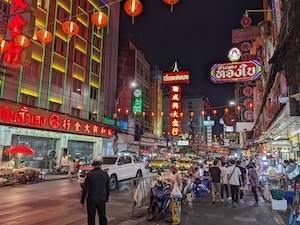
March 9, 2022 – Kristel, U.S. traveler: “My husband and I have been in Thailand since the start of 2022. In Bangkok, the typical hustle and bustle of the city feels similar to pre-covid days. Street food markets such as Chinatown is packed with both locals and foreigners while the temples are still fairly quiet depending on the time you visit.
With regards to restrictions, masks are still worn both indoors and outdoors and temperature checks are imposed when going into indoor spaces. Healthcare is easily accessible and rapid tests can be bought at a local 7-11 for very cheap. While a lot of restaurants have shut down, there are still plenty of good options and street food areas are staying busy and doing well. If visiting the islands, you can expect beautiful beaches without the crowds.”
February 11, 2022 – Abigail of I’m going on an adventure , British tourist: “My partner and I are currently travelling through Thailand for one month. We are in Phuket at the moment. Food and transport options are good with everything open and actually the area seems to have been revamped since a few years ago; its cleaner and better organised!
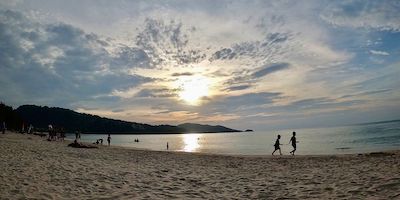
All areas are open and ready to receive guests. Face masks are still required to be worn however in the more populated tourist areas such a Patong no one seems to be using them as much. There is no contact tracing or daily testing required (except official PCR test). It’s always important to carry a face mask as some restaurants and activities will ask to have them on but in general the island so far has been very relaxed! The country still isn’t as busy as pre-covid which actually makes it an even better time to visit as it’s less crowded but there is still a nice holiday vibe.”
January 28, 2022 – Katy, American digital nomad: “ During our visit to Chiang Mai, we found that most businesses and restaurants in the Old Town area are open. Some are temporarily closed or have reduced hours, but enough were open that it wasn’t a problem. Bars are technically closed. Be aware that you can’t purchase alcohol at restaurants and stores after a certain time in the Chiang Mai province, I believe it’s 9pm now (but it keeps changing).
Travel restrictions are being followed closely by locals and visitors for the most part. Mask wearing and temperature checks are required at all businesses & shops and people do follow these rules. Contact tracing is also required (by scanning an app or signing a register), but we found that most people didn’t bother with this step.
The one exception is at the Chiang Mai Sunday market. Contact tracing (along with mask wearing and temperature scans) are firmly enforced there. Most of the Chiang Mai markets and walking streets are open, except for the Saturday Walking Street (which is closed) and the Night Bazaar (which is mostly closed and not worth visiting). There were some other foreigners in Chiang Mai but not many.
The city is used to having a larger number of tourists, so it didn’t feel too crowded and we didn’t have any issues with waiting in lines or securing tickets to popular attractions. Access to healthcare is easy and affordable in Chiang Mai (at least compared to what we’re used to in the United States). Booster shots are available to anyone (including foreigners) and you can get a PCR test for travel at the Chiang Mai Ram Hospital.”
January 2022 – Zoe Adventura , Australian: “ I moved to Thailand with my family in January 2022. The biggest difference between here and Australia is that everyone is expected to wear a mask all the time. Even children, and even while exercising. Most tourists don’t. Most people seem relaxed about everything, but occasionally we hear that the hospitals are full – which is pretty scary.
Travel restrictions – there are quite a few hoops to jump through to get to Thailand . We came for the Phuket Sandbox – which meant we had to book a 7 day stay in a government approved sandbox hotel, have a specific insurance paid for, and also get RT-PCR tests before travel, plus 2 more in the first week. During this week we were free to travel around Phuket. For us, it was actually pretty seamless.
Before entering Thailand you need to get a Thaipass, which can be a bit tricky, but there is plenty of information online about what you need to do. There are facebook groups which can help with any questions, and you can apply multiple times if you need.
As far as things being closed, the tourist areas of Phuket are completely different. Patong has restrictions on nightlife and alcohol service is restricted. A lot of shops are closed and boarded up in Patong, which is sad to see. On the other side of the island which typically has less tourism, it’s much less noticeable. That being said, the hotel we are currently staying in is clearly operating on skeleton staff, with half of the rooms empty. I’ve only seen 3-5 other guests, and it is a little creepy. The staff are obviously doing the best they can but the common areas are neglected. Same story in the last hotel we stayed in. All activities are cancelled, kids club is closed etc.”
December 2, 2021 – Katy, American digital nomad, A Rambling Unicorn : “My husband and I flew from Istanbul to Phuket on Nov. 27 and then will fly to Chiang Mai on Dec. 4 when our stay in the Sandbox is complete. We have Tourist Visas and will be in Thailand for 60 days.
I arrived at the Phuket Airport in November 2021 and was amazed at the thorough measures put into place for international arrivals. All passengers were initially seated in an arrivals hall in chairs that were spaced apart for social distancing. After a check of our documents by workers covered in full PPE, we were led through 5 different stations that verified our documents and administered a PCR test on-the-spot. We were glad we had printed all of our documents out in advance – including our Thai Pass, PCR Test results and SHA+ Hotel booking. Passengers without printed copies had to print them out at a special printing station.
Thai locals take COVID very seriously. Everyone wears masks in public, even when riding open-air motor scooters. Contact tracing is managed via the MorChana app which everyone is encouraged to download. We are staying in a remote part of Phuket where some restaurants are still closed and our hotel is only half full. We haven’t encountered any lines at restaurants or crowds in this part of the island, quite the opposite actually.
Thailand is really particular about the COVID insurance. When we first applied for the COE (this was the precursor to the Thai Pass), we tried to use our World Nomads insurance and it was rejected. I’ve heard anecdotally that they only accept COVID insurance from Thai companies. I don’t know if that is true and/or if things are relaxed now that they’ve moved to the Thai Pass. When we re-applied, we bought insurance through a Thai company that specialized in Thai Pass and Tourist Visa insurance. It came with document that clearly stated COVID was covered with a coverage of 50,000 USD.”
Thailand Reopening: Phuket Sandbox Updates video published October 29 2021 See what it’s like in Phuket, with commentary from local Thai people in the tourism industry as well as recent travelers to Phuket:
Planning a trip to Thailand?
Check out our other Thailand travel resources: – Things We Would (and Wouldn’t) Do Again in Chiang Mai, Thailand – Bangkok Tourist Pass Review and Suggested Itineraries – Review: Kindred Spirit Elephant Sanctuary + Hill Tribe Homestay – Tips for Travel in Bangkok
If you have questions or updates about travel to Thailand during the Coronavirus crisis or post-pandemic, please let us know in the comments below.
~ Pin this post for later or share with friends ~
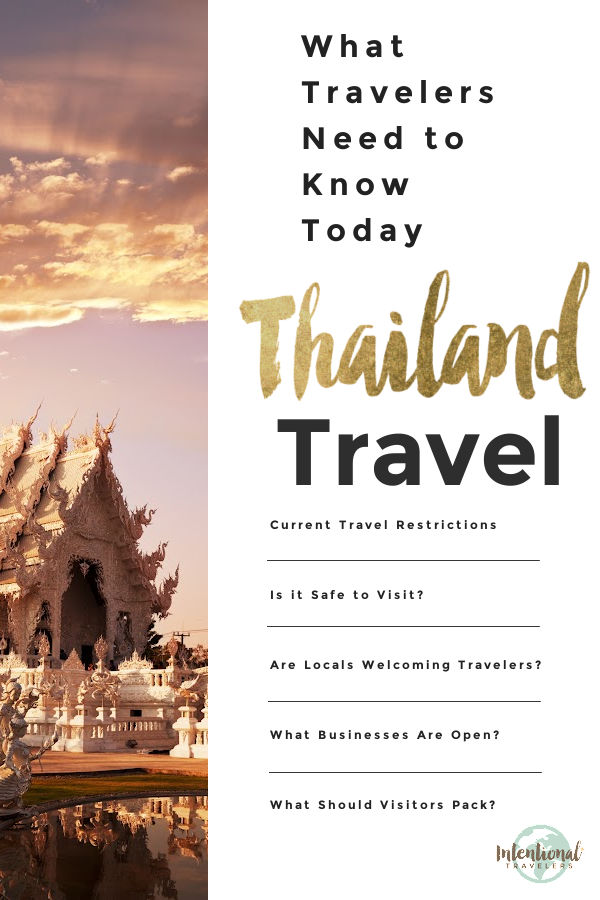
Disclaimer: Please note, travel restrictions change frequently. Readers must take responsibility for verifying information through official sources like the State Department and CDC, in respect to their specific situations. No responsibility can be accepted by Intentional Travelers for action or inaction as a result of information provided through IntentionalTravelers.com. Any information provided here is issued as general information only.
Similar Posts
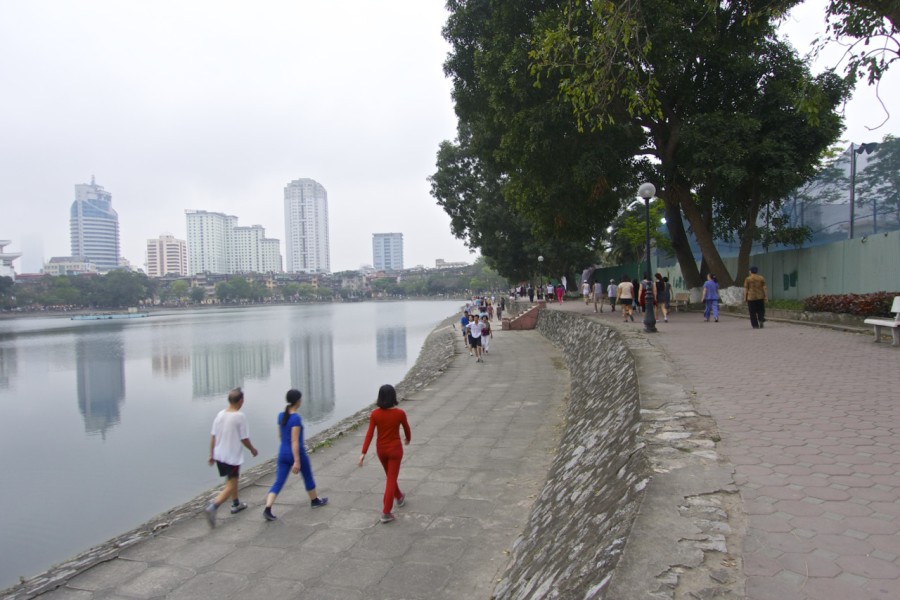
Staying Fit in Hanoi, Vietnam
No matter where we go around the world, it’s important to us to maintain a regular exercise habit. This can sometimes be a challenge on the road, but thankfully in Hanoi, there weren’t too many barriers. Our Morning Work Outs in Hanoi Our morning work outs fell under one of two approaches: 1. Doing work out…

Review: Kindred Spirit Elephant Sanctuary + Hill Tribe Homestay (with Video)
Southeast Asia has its fair share of elephant camps, sanctuaries, and various other elephant attractions. Nature & Wildlife tours, as well as trekking tours to the hill tribe villages, are some of the top things to do in Chiang Mai. While visiting elephants sounds exciting, visitors should be aware that the thriving travel market in…
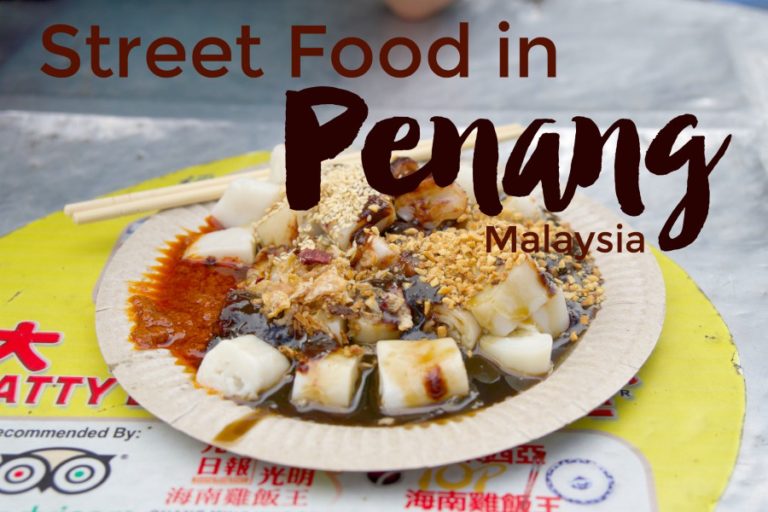
Top 10 must-try street foods when traveling Penang, Malaysia
Coming to Malaysia, visitors will never want to ignore Penang, the city with the most delicious street food in the country. This district is also called the world’s “heaven for food.” Penang has a lot of delicious dishes in colorful culinary style. It is a harmonious blend of Chinese, Indian, the West and of course,…

Great Things To Do Around Iwakuni, Japan
While slightly off the beaten path, we found that Iwakuni can actually be a great destination for a trip to Japan. For anyone visiting family at the Iwakuni Marine Corps Base, there are plenty of things to do in and around Iwakuni to fill up a week’s vacation. We spent several weeks in Iwakuni, visiting Jedd’s parents while…
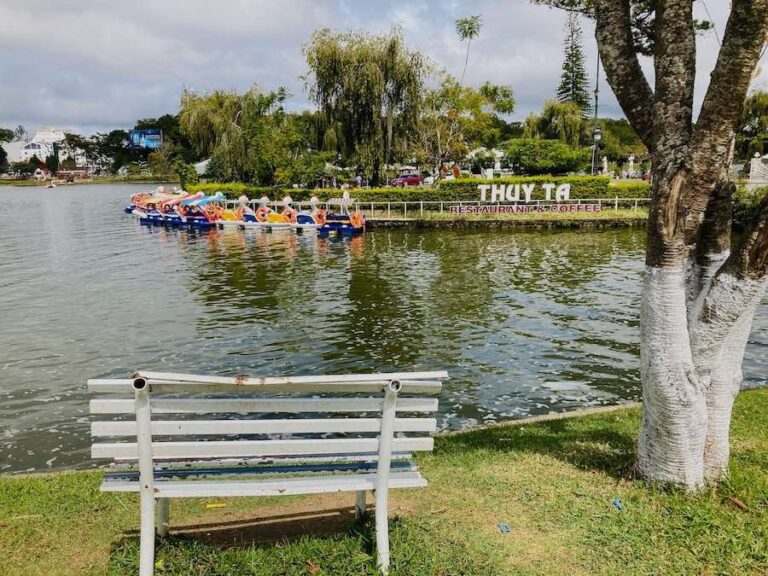
DaLat Itinerary, Self Guided Tour & DaLat Vietnam Map
Vietnam has been one of our favorite destinations in Southeast Asia. After multiple stays in Central Vietnam and Northern Vietnam, we kept hearing great things about the mountain city of Dalat. We finally got to visit DaLat Vietnam in 2023, where our excellent homestay hosts helped introduce us to the city and culture of Da…
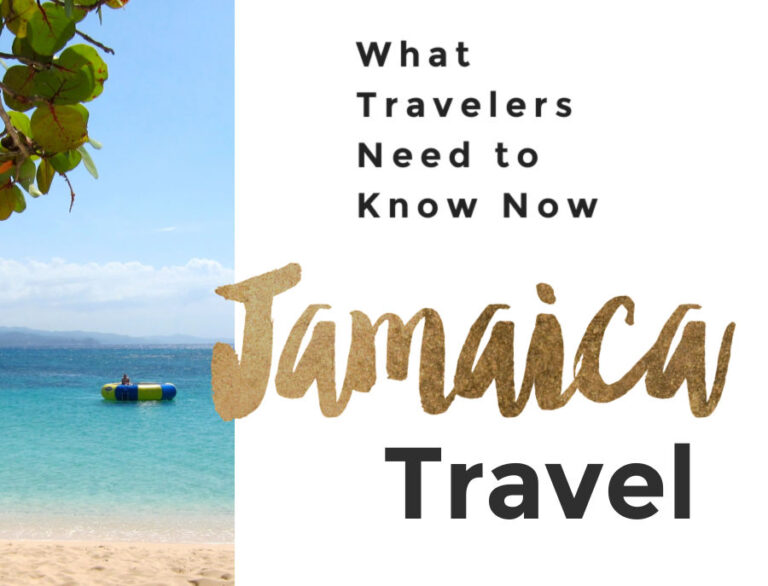
Jamaica travel requirements 2024: What travelers need to know
We aim to keep this post updated about Jamaica travel in 2024 with official Jamaica travel restrictions, requirements, and health and safety guidance. Our goal is to help you make informed decisions so you can travel confidently, safely, and responsibly in this new post-pandemic world of ours. At the end of the post, we share…
Leave a Reply Cancel reply
Your email address will not be published. Required fields are marked *
This site uses Akismet to reduce spam. Learn how your comment data is processed .
Kratom products have gone unregulated in California, unnerving both fans and critics

- Show more sharing options
- Copy Link URL Copied!
It comes in greenish powders, capsules and extracts, and is readily found in smoke shops and online.
Some say they use it for an energy boost or as a mood lifter. Others seek relief from pain. It can act both as a stimulant and as a sedative . Doctors have warned that in some cases, it has spurred seizures or vomiting, and the Drug Enforcement Administration categorizes it among its “drugs of concern.”
Yet “kratom is not regulated at all in California,” said Assemblymember Matt Haney (D-San Francisco.) Right now, there are “not even labeling requirements or age restrictions.”
Kratom products are derived from the leaves of the Mitragyna speciosa tree in Southeast Asia, where the plant has long been chewed and brewed in teas. Its complex effects have been tied to mitragynine and other alkaloids — chemical compounds containing nitrogen — that act on systems in the brain and body.
The Food and Drug Administration has warned against using kratom for medical treatment, stressing that it has not approved any medications containing kratom and that it cannot be legally marketed in the U.S. as a dietary supplement.

Science & Medicine
‘Miracle’ weight-loss drugs could have reduced health disparities. Instead they got worse
Ozempic and other drugs raised the possibility of reversing the country’s obesity crisis. Doctors are frustrated that they’ve made health disparities worse.
April 15, 2024
Yet roughly 2 million people in the U.S. use kratom, according to estimates from a federal survey , and some researchers and advocates say usage is actually much higher . Among those who have turned to the herbal substance is Dijon Evans, a 61-year-old living in Sacramento, who has a medical condition that wracks her with pain.
“My body feels like I’m being electrocuted from the inside out. I get these sharp electrical jolts that shoot through my body and my limbs,” Evans said. At one point, she started planning to end her life.
“I hate admitting that, but that’s the point I was at,” she said.
Someone on Facebook suggested kratom. Evans said she read up on it, talked to her doctors and family, and decided to order some kratom powder. It arrived in the mail. She downed half a teaspoon in orange juice.
The pain fell to a tolerable level, she said. “I was dumbfounded,” said Evans, who had been skeptical of herbal supplements. “Here’s something that I held no hope in helping me — and it quite literally saved my life.”
The Drug Enforcement Administration backed off on plans eight years ago to designate kratom as a “Schedule I” drug, a restrictive category for drugs without any accepted medical use, after pushback from kratom advocates and lawmakers.
But a patchwork of state and local laws have sprung up amid concerns about the array of kratom products found in stores and online, which researchers warn could have starkly different effects. In California, where kratom has become a common fixture in vape-and-smoke shops, lawmakers are now aiming to reel in an unregulated market.
Under AB 2365, the bill proposed this year by Haney, the state would require kratom products to be registered with the public health department. It would also regulate their chemical content, mandate labeling with alkaloid amounts and warnings that kratom may be habit forming, and bar kratom sales to anyone under 21.
“There are enough risks that it shouldn’t be a total free-for-all,” Haney said. “People should know what they’re buying. Kids shouldn’t buy it. And we should make it clear that there’s a difference between a bottle that may seem the same size — but may have exponentially more potency.”
The proposed rules also prohibit kratom products from containing synthesized forms of kratom chemicals that have troubled some researchers and advocates, who warn that such products could veer far from the chemical profile in the plant.
Matthew Lowe, executive director of the advocacy group Global Kratom Coalition, said some synthetic products have “very, very high doses” of a particular chemical found in scant amounts in kratom leaf material. Several kratom researchers have warned that chemical — 7-hydroxymitragynine — poses a higher risk of abuse.
“It certainly isn’t kratom as nature intended,” said Lowe, whose organization supports the California bill. Kratom products should have “the same ratios as the alkaloids are found within nature.”

She died after liposuction by a pediatrician. Doctors warn of cosmetic surgery’s ‘Wild West’
In California, doctors trained as pediatricians, OB-GYNs and other specialties can take on lucrative — and potentially risky — cosmetic surgeries. Some have branched out with little or no surgical training.
April 5, 2024
And in the absence of regulation — including requirements for clear labeling — consumers may unwittingly use more of the substance than they expect, Lowe said. When Alexander Karp began using kratom for pain relief, he grew frustrated trying to ensure he could reliably get the same kind of product from “very questionable” online vendors.
“What’s allowed me to get the consistency I want as a consumer is simple, proper labeling — as well as quantifying the active ingredient,” said Karp, who later cofounded a kratom company that manufactures products in Vista.
The California bill is backed by law enforcement groups, a coalition of which praised the proposal as “a first step in regulating this mind-altering substance.”
Bans on kratom now speckle the country, including entire states like Alabama as well as California cities like San Diego and Newport Beach . The American Kratom Assn., an advocacy group that opposes such bans, said regulations requiring labeling and other standards are needed to protect consumers. The group has promoted a set of rules called the “Kratom Consumer Protection Act,” which were adopted in a dozen states as of mid-April.
But Mac Haddow, its senior fellow on public policy, argued that the California bill “goes too far” and would necessitate a costly enforcement structure that “would impose a huge fiscal burden on taxpayers.”
For instance, Haddow said proposed rules related to the ratio of different alkaloids in products would require “highly sensitive scientific equipment” and “a significant number of kratom experts to enforce.” If the costs are borne by sellers, he said, registration fees would be “astronomical and force many products out of the market.”
Karp echoed such concerns, saying that if fees are costly for companies that want to follow the rules, “it generally creates this gray market where others will fill the void and get a product to the consumer going around these regulations.”
Haney said he remains open to hashing out such issues. “We are trying to both give consumers the information to protect themselves,” he said, “and also draw the lines” about what products should be allowed.
The push for new regulations comes as kratom has continued to draw both interest and concern. The National Institute on Drug Abuse is exploring medicinal uses for kratom, including as a possible treatment for opioid addiction, but cautions that researchers are still learning more about its effects.
“Unlike something like caffeine or cannabis that’s really acting on one system (in the brain and body), this is acting on many different systems,” said Kirsten Smith, assistant professor of psychiatry and behavioral sciences at Johns Hopkins University.
Smith said that regular use of kratom can lead to mild-to-moderate withdrawal symptoms from halting use. In a survey of kratom users , she and other researchers found that most “reported using kratom in a seemingly nonproblematic way,” and more frequent use was not associated with “social or functional impairment.”
The National Institute on Drug Abuse says more research is needed into kratom and the risk of addiction. Some Californians say they’ve grappled with kratom addiction: Nick, a 44-year-old living in North Hollywood who asked not to use his last name to discuss his substance use, said he had previously recovered from addiction to heroin and oxycodone when a friend recommended kratom.
He said he had higher energy and remained “quite functional” for a few years, but eventually “my entire day orbited around kratom use ... It was just consuming every aspect of my life.” He ultimately went to Alcoholics Anonymous for help, he said.
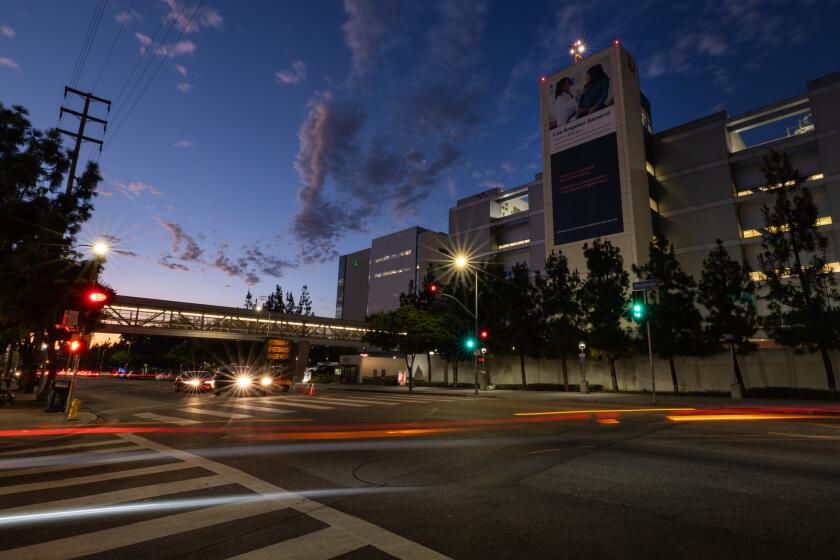
‘Scandalous’: L.A. General again among highest in U.S. in restraining psychiatric patients
The safety-net hospital restrained patients in its psychiatric inpatient unit at the fourth-highest rate of any such facility in the U.S. in 2022.
Feb. 3, 2024
Yet others have credited it with helping them shake off addiction to other substances. In San Bernardino County, Jordan Richard said he began using it after an opioid overdose to manage his “addictive tendencies.”
Without it, “I’d be dead or in jail,” said Richard, a 33-year-old who now owns a company that sells kratom powder and capsules.
Among the physical effects of kratom exposure that have raised concerns are cardiovascular effects such as changes in blood pressure, as well as seizures, said Chris McCurdy, a University of Florida chemist, behavioral pharmacologist and pharmacist.
Although some of its effects echo those of opioids, the mixture of chemicals normally present in kratom — such as in powdered leaf products — has not shown the same dangerous effects on breathing as opioids like heroin or fentanyl, researchers said.
Experts have also stressed that not all kratom is equal . McCurdy likened the modern range in kratom products to the difference between light beer and everclear. One of the key questions facing scientists, he said, is what levels are safe and potentially beneficial and what amounts could become harmful.
In the U.S., “we supersize everything. It’s become more and more concentrated,” he said.
Researchers have raised particular concern about synthesized products that isolate chemicals like 7-hydroxymitragynine, saying they could carry risks that are different from the kratom leaf long used in Thailand or Malaysia. McCurdy said when that chemical is isolated, “it’s no longer really a kratom product.”
Smith said that “the further you get away from the botanical that’s been used for hundreds of years in Southeast Asia, the less we know about it — and the more uncertainty we have.”
Among the “rare but serious” effects physicians have reported are seizures, vomiting and liver problems, according to the National Institute on Drug Abuse. Kratom has also been involved in a small fraction of U.S. overdose deaths, although most also involved other drugs, analyses have found .
In California, medical examiners and coroners tallied 87 “kratom involved” deaths in 2022 — fatalities in which kratom or mitragynine were listed on a death certificate. However, only seven of the death certificates mentioned kratom as the only substance involved, according to data provided by the state public health department.
Molly Bowdring, a research fellow at the Stanford Prevention Research Center, said if people are taking kratom with other drugs or substances, it’s possible there could be a “compound effect.”
“We just don’t have enough data to suggest that it is completely safe,” Bowdring said.
In some cases, families of people who died after taking kratom for pain relief have successfully sued kratom sellers, faulting them for inadequate warnings about health risks. In California, lawsuits have been filed against the beverage company Botanic Tonics alleging it “misleadingly omitted the effects of kratom” in marketing materials.
Botanic Tonics has denied the allegations in court filings. A spokesperson said the company supports “more robust regulation” like AB 2365.
“Our belief is that consumers have the right and expectation to know what they are consuming,” he said.
More to Read

California moves to ban the use of paraquat, a powerful weedkiller
April 8, 2024

California communities are banning syringe programs. Now the state is fighting back in court
March 19, 2024

After Newsom veto, California lawmakers try again to ban tampons with ‘forever chemicals’
March 12, 2024
Start your day right
Sign up for Essential California for news, features and recommendations from the L.A. Times and beyond in your inbox six days a week.
You may occasionally receive promotional content from the Los Angeles Times.

Emily Alpert Reyes covers public health for the Los Angeles Times.
More From the Los Angeles Times

Many O.C. residents skeptical of election results, potentially swaying key races, poll finds

Canny as a crocodile but dumber than a baboon — new research ponders T. rex’s brain power

Bob Pool, veteran L.A. Times newsman and observer of the human condition, dies at 79
April 28, 2024

Commencement speakers launch boycott of USC satellite graduation ceremonies

IMAGES
VIDEO
COMMENTS
The COVID-19 pandemic wreaked havoc on the world. International travel ground to a halt and countries were forced to implement strict processes and entry requirements to halt the spread of the virus. Thailand introduced quarantine measures and Thailand Pass. Thailand Pass required visitors to register details like vaccination status, flight, and hotel bookings, and confirmation
From 1 May 2022, travelers entering Thailand by air will be subject to new entry measures, as follows; 1. Fully Vaccinated Persons must : - Register on Thailand Pass. - Attach required documents including passport, certificate of vaccination. - Attach proof of insurance with at least 10,000 USD coverage for medical treatments in Thailand (for ...
Thailand under the Visa Exemption Scheme or Visa on Arrival (VOA), must apply for a visa. ... 1. Entry requirements (effective from 1 May 2022): ... o Travel health insurance covering health care and treatment expenses for COVID-19 disease, or any other guarantee throughout their stay in the Kingdom, with a ...
The TAT International Public Relations Division works with traditional and online media channels to promote Thailand as a tourism destination for travellers worldwide. Thailand has announced the latest entry rules effective from 1 May, 2022, with specific requirements for vaccinated and unvaccinated / not fully vaccinated travellers from all ...
*From 1 May 2021, all travellers who wish to enter Thailand will be quarantined for 14 days regardless to their country of origin or vaccination status. *Travellers who have obtained their Certificate of Entry (COE) prior to 1 May 2021 and arrive before 6 May 2021 will be quarantined for 7 or 10 days, depending on their vaccination status.
Thailand entry details and exceptions. Effective January 9 to January 31, 2023 - Travelers (aged 18 years old and above) arriving in Thailand must have proof of vaccination; or proof of recovery from COVID in the last 6 months; or you may also provide a vaccine-exemption letter from a doctor stating you cannot receive a COVID vaccine due to ...
Entry and Exit Requirements. ... 2022 onwards, travelers entering Thailand will no longer be required to present COVID-19 related documents such as the certificate of vaccination and COVID-19 test result upon arrival in Thailand. ... Thailand Information and Travel Advisory page from travel.state.gov.
Thailand Pass registration. Valid passport. Confirmed Alternative Quarantine (AQ) hotel booking for 5 days (including 1 RT-PCR test) Insurance with minimum of 10,000 USD coverage for medical treatments in Thailand (for non-Thai travelers only). NOTE: RT-PCR test on Day 4 - 5 of mandatory quarantine is required.
Thailand's entry requirements from 1 July 2022. Thailand Pass removed, Also lifting an US$10,000 health insurance requirement, thus welcoming all travellers with proof of either a certificate of vaccination or a pre-arrival negative RT-PCR or professional ATK test result. Learn More & Suggestion. Traveller's Journey.
From 1 July 2022, the Thailand Pass registration scheme and a health insurance requirement for foreign visitors will be lifted. Travellers will only need to show proof of either a certificate of vaccination or a negative RT-PCR or professional ATK test result within 72 hours of travel.
Call us in Washington, D.C. at 1-888-407-4747 (toll-free in the United States and Canada) or 1-202-501-4444 (from all other countries) from 8:00 a.m. to 8:00 p.m., Eastern Standard Time, Monday through Friday (except U.S. federal holidays). See the State Department's travel website for the Worldwide Caution and Travel Advisories.
Home. THAILAND. Last update: 09 January 2023 - 12:00pm. Most countries THAI flies to have introduced additional entry, transiting and travel requirements due to COVID-19. You must meet all the regulations applicable to your journey, including those in place for your destination and if you have connecting flights as part of your itinerary.
Visa requirements. British passport holders arriving by air or land can enter Thailand for 30 days without a visa (visa exemption). If you intend to stay longer (for work, study or other reasons ...
Travelers holding US passports can enter Thailand for tourism purposes without the need to obtain a visa for stays up to 30 days on each visit. Thailand temporarily extended this visa exemption to 45 days for arrivals previously. However, as of April 2023, visa-free entries has reverted back to 30 days. Travelers can always extend the standard ...
1. Keep up with the latest Thailand travel restrictions. First and foremost, before booking that holiday in Thailand, get to know the three current programs that travellers can use to enter the country and what the various travel requirements are. Note: Starting 1 Apr 2022, Thailand has removed the requirement for travellers to undergo Pre ...
Announced in August 2022, these travelers are now given permission for a 45-day stay in Thailand. For travelers eligible for a visa on arrival (for example, those with passports from Mexico and ...
THAILAND IS OPEN FOR TOURISM. From November 2021, fully vaccinated travellers have been allowed to enter Thailand easily via the Test & Go Thailand Pass. This scheme was temporarily suspended between December 2021 and January 2022 due to the Omicron variant, but from February 2022 this has been reinstated!
In California, medical examiners and coroners tallied 87 "kratom involved" deaths in 2022 — fatalities in which kratom or mitragynine were listed on a death certificate.